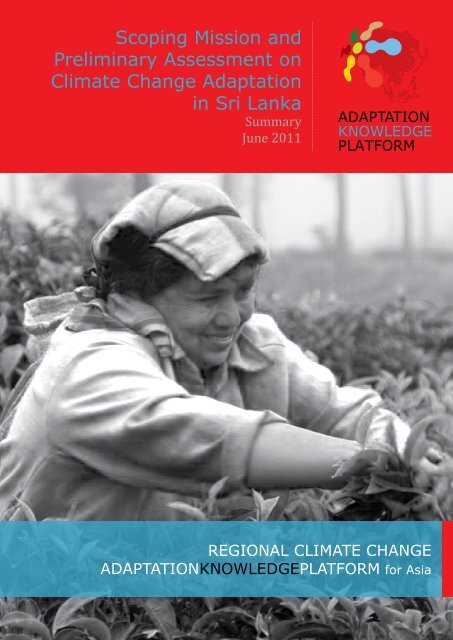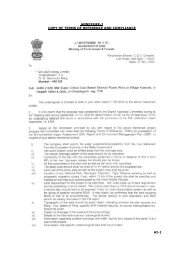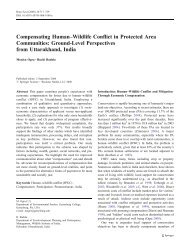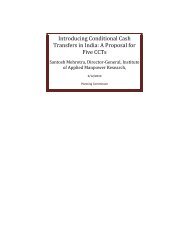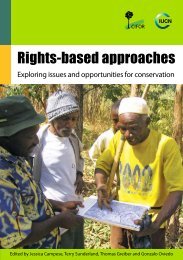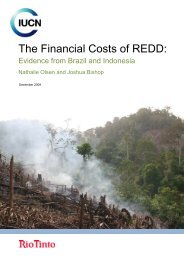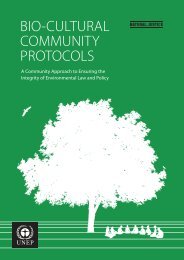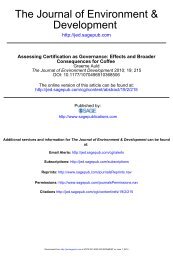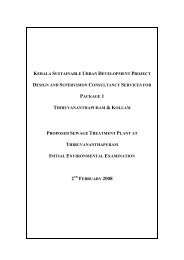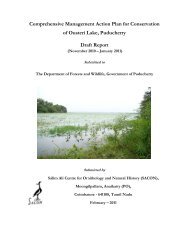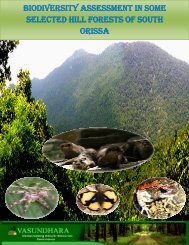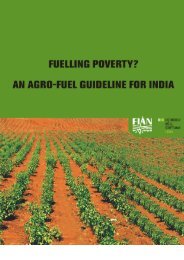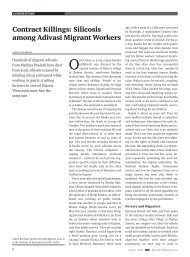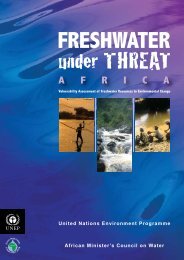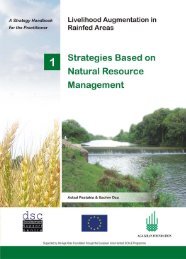Scoping Mission and Preliminary Assessment on Climate Change ...
Scoping Mission and Preliminary Assessment on Climate Change ...
Scoping Mission and Preliminary Assessment on Climate Change ...
You also want an ePaper? Increase the reach of your titles
YUMPU automatically turns print PDFs into web optimized ePapers that Google loves.
<str<strong>on</strong>g>Scoping</str<strong>on</strong>g> <str<strong>on</strong>g>Missi<strong>on</strong></str<strong>on</strong>g> <str<strong>on</strong>g>and</str<strong>on</strong>g><br />
<str<strong>on</strong>g>Preliminary</str<strong>on</strong>g> <str<strong>on</strong>g>Assessment</str<strong>on</strong>g> <strong>on</strong><br />
<strong>Climate</strong> <strong>Change</strong> Adaptati<strong>on</strong><br />
in Sri Lanka<br />
Summary<br />
June 2011<br />
REGIONAL CLIMATE CHANGE<br />
ADAPTATIONKNOWLEDGEPLATFORM for Asia
Acknowledgements<br />
The <str<strong>on</strong>g>Scoping</str<strong>on</strong>g> <str<strong>on</strong>g>Missi<strong>on</strong></str<strong>on</strong>g> <str<strong>on</strong>g>and</str<strong>on</strong>g> <str<strong>on</strong>g>Preliminary</str<strong>on</strong>g> <str<strong>on</strong>g>Assessment</str<strong>on</strong>g> <strong>on</strong> <strong>Climate</strong> <strong>Change</strong><br />
Adaptati<strong>on</strong> in Sri Lanka was c<strong>on</strong>ducted <str<strong>on</strong>g>and</str<strong>on</strong>g> written in 2010 <str<strong>on</strong>g>and</str<strong>on</strong>g> 2011.<br />
The <str<strong>on</strong>g>Assessment</str<strong>on</strong>g> draws <strong>on</strong> work in progress related to the Adaptati<strong>on</strong><br />
Knowledge Platform to disseminate <str<strong>on</strong>g>and</str<strong>on</strong>g> exchange adaptati<strong>on</strong> knowledge<br />
with a wider audience. We thank the countless instituti<strong>on</strong>s, organizati<strong>on</strong>s,<br />
<str<strong>on</strong>g>and</str<strong>on</strong>g> individuals that have provided key inputs <str<strong>on</strong>g>and</str<strong>on</strong>g> their insights. We are<br />
grateful to all officers <str<strong>on</strong>g>and</str<strong>on</strong>g> experts c<strong>on</strong>sulted (<str<strong>on</strong>g>and</str<strong>on</strong>g> included in Annex 3 of this<br />
report), for their availability <str<strong>on</strong>g>and</str<strong>on</strong>g> for the time dedicated to the process. The<br />
report greatly benefited from the comments <str<strong>on</strong>g>and</str<strong>on</strong>g> suggesti<strong>on</strong>s shared <strong>on</strong> the<br />
governance <str<strong>on</strong>g>and</str<strong>on</strong>g> <strong>on</strong> the state of climate change adaptati<strong>on</strong> in Sri Lanka from<br />
which <strong>on</strong>e of them.<br />
Prepared by: Serena Fortuna, <strong>Climate</strong> <strong>Change</strong> <str<strong>on</strong>g>and</str<strong>on</strong>g> Disaster Risk Reducti<strong>on</strong><br />
associate professi<strong>on</strong>al officer, UNEP Regi<strong>on</strong>al Office for Asia <str<strong>on</strong>g>and</str<strong>on</strong>g> the Pacific<br />
With assistance <str<strong>on</strong>g>and</str<strong>on</strong>g> inputs from: <str<strong>on</strong>g>Scoping</str<strong>on</strong>g> missi<strong>on</strong> team members, Satya<br />
Priya, Muanp<strong>on</strong>g Juntopas <str<strong>on</strong>g>and</str<strong>on</strong>g> Dusita Krawanchid, <str<strong>on</strong>g>and</str<strong>on</strong>g> Secretariat of the<br />
Adaptati<strong>on</strong> Knowledge Platform, Roopa Rakshit <str<strong>on</strong>g>and</str<strong>on</strong>g> Hiromi Inagaki.<br />
Special thanks for documents, opini<strong>on</strong>s <str<strong>on</strong>g>and</str<strong>on</strong>g> support: A special thanks goes<br />
to the UNDP Sri Lanka country office with special reference to An<str<strong>on</strong>g>and</str<strong>on</strong>g>a<br />
Mallawatantri, Assistant Resident Representative <str<strong>on</strong>g>and</str<strong>on</strong>g> Team Leader<br />
- Envir<strong>on</strong>ment, Energy <str<strong>on</strong>g>and</str<strong>on</strong>g> Disaster Management <str<strong>on</strong>g>and</str<strong>on</strong>g> Janaka Gamage,<br />
Programme Development Officer, for having supported the organizati<strong>on</strong> of<br />
the process <str<strong>on</strong>g>and</str<strong>on</strong>g> the revisi<strong>on</strong> of the report. Great appreciati<strong>on</strong> <str<strong>on</strong>g>and</str<strong>on</strong>g> thanks to<br />
all the individuals <str<strong>on</strong>g>and</str<strong>on</strong>g> organizati<strong>on</strong>s c<strong>on</strong>sulted <str<strong>on</strong>g>and</str<strong>on</strong>g> briefed (Annex 3 of this<br />
report).<br />
Copyright © AIT-UNEP RRC.AP 2011<br />
Bangkok, Thail<str<strong>on</strong>g>and</str<strong>on</strong>g><br />
June 2011<br />
How to obtain the digital copy:<br />
The <str<strong>on</strong>g>Scoping</str<strong>on</strong>g> missi<strong>on</strong> <str<strong>on</strong>g>and</str<strong>on</strong>g> preliminary assessment <strong>on</strong> <strong>Climate</strong> <strong>Change</strong> Adaptati<strong>on</strong> in Sri Lanka<br />
- Summary can be electr<strong>on</strong>ically down loaded from the www.asiapacificadapt.net.<br />
This digital publicati<strong>on</strong> may be reproduced in whole or in part <str<strong>on</strong>g>and</str<strong>on</strong>g> in any form for educati<strong>on</strong>al or n<strong>on</strong>profit<br />
purposes without special permissi<strong>on</strong> from the copyright holder, provided acknowledgement<br />
of the source is made. The Regi<strong>on</strong>al <strong>Climate</strong> <strong>Change</strong> Adaptati<strong>on</strong> Knowledge Platform for Asia would<br />
appreciate receiving a copy of any publicati<strong>on</strong> that uses this report as a source.
<str<strong>on</strong>g>Scoping</str<strong>on</strong>g> <str<strong>on</strong>g>Missi<strong>on</strong></str<strong>on</strong>g> <str<strong>on</strong>g>and</str<strong>on</strong>g> <str<strong>on</strong>g>Preliminary</str<strong>on</strong>g><br />
<str<strong>on</strong>g>Assessment</str<strong>on</strong>g> <strong>on</strong><br />
<strong>Climate</strong> <strong>Change</strong> Adaptati<strong>on</strong><br />
in Sri Lanka<br />
Summary<br />
June 2011
C<strong>on</strong>tents<br />
Abbreviati<strong>on</strong>s & Acr<strong>on</strong>yms<br />
Executive Summary<br />
i<br />
iii<br />
<str<strong>on</strong>g>Scoping</str<strong>on</strong>g> <str<strong>on</strong>g>Missi<strong>on</strong></str<strong>on</strong>g> <str<strong>on</strong>g>and</str<strong>on</strong>g> <str<strong>on</strong>g>Preliminary</str<strong>on</strong>g> <str<strong>on</strong>g>Assessment</str<strong>on</strong>g> <strong>on</strong> <strong>Climate</strong><br />
<strong>Change</strong> Adaptati<strong>on</strong> in Sri Lanka<br />
2<br />
Objectives 2<br />
<str<strong>on</strong>g>Scoping</str<strong>on</strong>g> <str<strong>on</strong>g>Missi<strong>on</strong></str<strong>on</strong>g> Team Members 2<br />
Key Findings 3<br />
<str<strong>on</strong>g>Scoping</str<strong>on</strong>g> <str<strong>on</strong>g>Assessment</str<strong>on</strong>g> 4<br />
Web-Based Portal 5<br />
Nati<strong>on</strong>al Platform 5<br />
Sec<strong>on</strong>d stage, 2011 potential activities 5<br />
Minutes of C<strong>on</strong>sultati<strong>on</strong>s with Stakeholders 5<br />
Asian Development Bank (ADB) 5<br />
<strong>Climate</strong> <strong>Change</strong> Secretariat (CCS), Ministry of Envir<strong>on</strong>ment <str<strong>on</strong>g>and</str<strong>on</strong>g><br />
Natural Resources<br />
8<br />
EML C<strong>on</strong>sultants 10<br />
Envir<strong>on</strong>mental Foundati<strong>on</strong> Limited 11<br />
Food <str<strong>on</strong>g>and</str<strong>on</strong>g> Agriculture Organizati<strong>on</strong> (FAO) 11<br />
German Technical Cooperati<strong>on</strong> (GTZ) 12<br />
Internati<strong>on</strong>al Water Management Institute (IWMI) (Hq <str<strong>on</strong>g>and</str<strong>on</strong>g> Sri Lanka<br />
programme)<br />
12<br />
IUCN (Internati<strong>on</strong>al Uni<strong>on</strong> for C<strong>on</strong>servati<strong>on</strong> of Nature) 13<br />
Ministry of Agriculture 13<br />
MIND 14<br />
Practical Acti<strong>on</strong>s 15<br />
Sewalanka Foundati<strong>on</strong> <str<strong>on</strong>g>and</str<strong>on</strong>g> Sri Cret/Sri Lanka Nature Forum 17<br />
UNDP Sri Lanka office 17<br />
United Nati<strong>on</strong>s Office for Project Services (UNOPS) 19<br />
The World Bank, Sri Lanka country office 19<br />
Annex 1 21<br />
Annex 2 22<br />
Annex 3 22
Abbreviati<strong>on</strong>s & Acr<strong>on</strong>yms<br />
ADB<br />
ADB TA<br />
ADBI<br />
AIT-UNEP RRC.AP<br />
AIM<br />
CCA<br />
CCD<br />
CCS<br />
CIDA<br />
DRR<br />
ELG<br />
FAO<br />
FAO TCP<br />
GTZ<br />
IPCC<br />
ISDR<br />
IUCN<br />
IWMI<br />
MFF<br />
MOE<br />
NACCC<br />
NATCOMS<br />
NDCC<br />
NGO<br />
NORAD<br />
REDD<br />
SEI<br />
TA<br />
UNDP<br />
UNEP<br />
UNFCCC<br />
UNOPS<br />
ASIAN DEVELOPMENT BANK<br />
ASIAN DEVELOPMENT BANK TECHNICAL ASSISTANCE<br />
ASIAN DEVELOPMENT BANK INSTITUTE<br />
ASIAN INSTITUTE OF TECHNOLOGY – UNITED NATIONS<br />
ENVIRONMENT PROGRAMME REGIONAL RESOURCE CENTRE<br />
FOR ASIA AND THE PACIFIC<br />
ACTION IMPACT MATRIX<br />
CLIMATE CHANGE ADAPTATION<br />
COAST CONSERVATION DEPARTMENT<br />
CLIMATE CHANGE SECRETARIAT<br />
CANADIAN INTERNATIONAL DEVELOPMENT AGENCY<br />
DISASTER RISK REDUCTION<br />
ECOSYSTEMS AND LIVELIHOODS GROUP<br />
FOOD AND AGRICULTURE ORGANISATION<br />
FOOD AND AGRICULTURE ORGANISATION TECHNICAL<br />
COOPERATION PROJECT<br />
GERMAN TECHNICAL CORPORATION<br />
INTERGOVERNMENTAL PANEL ON CLIMATE CHANGE<br />
INTERNATIONAL STRATEGY FOR DISASTER REDUCTION<br />
INTERNATIONAL UNION FOR CONSERVATION OF NATURE<br />
INTERNATIONAL WATER MANAGEMENT INSTITUTE<br />
MANGROVES FOR THE FUTURE<br />
MINISTRY OF ENVIRONMENT<br />
NATIONAL ADVISORY COMMITTEE ON CLIMATE CHANGE<br />
NATIONAL COMMUNICATIONS<br />
NATIONAL DISASTER COORDINATING COMMITTEE<br />
NON-GOVERNMENTAL ORGANIZATION<br />
NORWEGIAN AGENCY DEVELOPMENT COOPERATION<br />
REDUCING EMISSIONS FROM DEFORESTATION AND FOREST<br />
DEGRADATION<br />
STOCKHOLM ENVIRONMENT INSTITUTE<br />
TECHNICAL ASSISTANCE<br />
UNITED NATIONS DEVELOPMENT PROGRAMME<br />
UNITED NATIONS ENVIRONMENT PROGRAMME<br />
UNITED NATIONS FRAMEWORK CONVENTION ON CLIMATE<br />
CHANGE<br />
UNITED NATIONS OFFICE FOR PROJECT SERVICES<br />
i
Through its work the Adaptati<strong>on</strong><br />
Knowledge Platform is working towards<br />
building bridges between current<br />
knowledge <strong>on</strong> adaptati<strong>on</strong> to climate<br />
change <str<strong>on</strong>g>and</str<strong>on</strong>g> the governments, agencies <str<strong>on</strong>g>and</str<strong>on</strong>g><br />
communities that need this knowledge to<br />
inform their resp<strong>on</strong>ses to the challenges<br />
that climate change presents to them.<br />
Photo credit: Serena Fortuna
Executive Summary<br />
The Regi<strong>on</strong>al <strong>Climate</strong> <strong>Change</strong> Adaptati<strong>on</strong> Knowledge Platform for Asia (hereinafter, referred to as the<br />
Adaptati<strong>on</strong> Knowledge Platform) has been developed to resp<strong>on</strong>d to dem<str<strong>on</strong>g>and</str<strong>on</strong>g> for effective mechanisms<br />
for sharing informati<strong>on</strong> <strong>on</strong> climate change adaptati<strong>on</strong> <str<strong>on</strong>g>and</str<strong>on</strong>g> developing adaptive capacities in Asian<br />
countries, many of whom are the most vulnerable to the effects of climate change. The Adaptati<strong>on</strong> Knowledge<br />
Platform supports research <str<strong>on</strong>g>and</str<strong>on</strong>g> capacity building, policy making <str<strong>on</strong>g>and</str<strong>on</strong>g> informati<strong>on</strong> sharing to help countries<br />
in Asia adapt to the challenges of climate change. The Adaptati<strong>on</strong> Knowledge Platform will facilitate climate<br />
change adaptati<strong>on</strong> at local, nati<strong>on</strong>al <str<strong>on</strong>g>and</str<strong>on</strong>g> regi<strong>on</strong>al levels to strengthen adaptive capacity of countries in the<br />
regi<strong>on</strong> – while working with existing <str<strong>on</strong>g>and</str<strong>on</strong>g> emerging networks <str<strong>on</strong>g>and</str<strong>on</strong>g> initiatives.<br />
Through its work the Adaptati<strong>on</strong> Knowledge Platform is working towards building bridges between current<br />
knowledge <strong>on</strong> adaptati<strong>on</strong> to climate change <str<strong>on</strong>g>and</str<strong>on</strong>g> the governments, agencies <str<strong>on</strong>g>and</str<strong>on</strong>g> communities that need this<br />
knowledge to inform their resp<strong>on</strong>ses to the challenges that climate change presents to them. This is reflected<br />
in the Platform Goal, which is to facilitate climate change adaptati<strong>on</strong> in Asia at local, nati<strong>on</strong>al <str<strong>on</strong>g>and</str<strong>on</strong>g> regi<strong>on</strong>al<br />
levels <str<strong>on</strong>g>and</str<strong>on</strong>g> strengthen adaptive capacity.<br />
The specific Purpose of the Adaptati<strong>on</strong> Knowledge Platform is to establish a regi<strong>on</strong>ally <str<strong>on</strong>g>and</str<strong>on</strong>g> nati<strong>on</strong>ally owned<br />
mechanism that facilitates the integrati<strong>on</strong> of climate change adaptati<strong>on</strong> into nati<strong>on</strong>al <str<strong>on</strong>g>and</str<strong>on</strong>g> regi<strong>on</strong>al ec<strong>on</strong>omic<br />
<str<strong>on</strong>g>and</str<strong>on</strong>g> development policies, processes <str<strong>on</strong>g>and</str<strong>on</strong>g> plans, strengthens linkages between adaptati<strong>on</strong> <str<strong>on</strong>g>and</str<strong>on</strong>g> the sustainable<br />
development agenda in the regi<strong>on</strong> <str<strong>on</strong>g>and</str<strong>on</strong>g> enhances instituti<strong>on</strong>al <str<strong>on</strong>g>and</str<strong>on</strong>g> research capacity.<br />
In order to achieve this purpose, the Adaptati<strong>on</strong> Knowledge Platform will bring together policy-makers,<br />
adaptati<strong>on</strong> researchers, practiti<strong>on</strong>ers, <str<strong>on</strong>g>and</str<strong>on</strong>g> business leaders <str<strong>on</strong>g>and</str<strong>on</strong>g> will work through a range of activities to<br />
achieve three comp<strong>on</strong>ents:<br />
a. Regi<strong>on</strong>al knowledge sharing system: a regi<strong>on</strong>ally <str<strong>on</strong>g>and</str<strong>on</strong>g> nati<strong>on</strong>ally owned mechanism to promote<br />
dialogue <str<strong>on</strong>g>and</str<strong>on</strong>g> improve the exchange of knowledge, informati<strong>on</strong> <str<strong>on</strong>g>and</str<strong>on</strong>g> methods within <str<strong>on</strong>g>and</str<strong>on</strong>g> between<br />
countries <strong>on</strong> climate change adaptati<strong>on</strong> <str<strong>on</strong>g>and</str<strong>on</strong>g> to link existing <str<strong>on</strong>g>and</str<strong>on</strong>g> emerging networks <str<strong>on</strong>g>and</str<strong>on</strong>g> initiatives.<br />
b. Generati<strong>on</strong> of new knowledge: to facilitate the generati<strong>on</strong> of new climate change adaptati<strong>on</strong> knowledge<br />
promoting underst<str<strong>on</strong>g>and</str<strong>on</strong>g>ing <str<strong>on</strong>g>and</str<strong>on</strong>g> providing guidance relevant to the development <str<strong>on</strong>g>and</str<strong>on</strong>g> implementati<strong>on</strong> of<br />
nati<strong>on</strong>al <str<strong>on</strong>g>and</str<strong>on</strong>g> regi<strong>on</strong>al climate change adaptati<strong>on</strong> policy, plans <str<strong>on</strong>g>and</str<strong>on</strong>g> processes focused <strong>on</strong> climate change<br />
adaptati<strong>on</strong>.<br />
c. Applicati<strong>on</strong> of existing <str<strong>on</strong>g>and</str<strong>on</strong>g> new knowledge: synthesis of existing <str<strong>on</strong>g>and</str<strong>on</strong>g> new climate change adaptati<strong>on</strong><br />
knowledge to facilitate its applicati<strong>on</strong> in sustainable development practices at the local, nati<strong>on</strong>al <str<strong>on</strong>g>and</str<strong>on</strong>g><br />
regi<strong>on</strong>al levels.<br />
In collaborati<strong>on</strong> with a wide range of nati<strong>on</strong>al <str<strong>on</strong>g>and</str<strong>on</strong>g> regi<strong>on</strong>al partners, the Adaptati<strong>on</strong> Knowledge Platform<br />
will aim at establishing a regi<strong>on</strong>ally <str<strong>on</strong>g>and</str<strong>on</strong>g> nati<strong>on</strong>ally owned informati<strong>on</strong> exchange mechanism that facilitates<br />
the integrati<strong>on</strong> of climate change adaptati<strong>on</strong> into nati<strong>on</strong>al <str<strong>on</strong>g>and</str<strong>on</strong>g> regi<strong>on</strong>al ec<strong>on</strong>omic <str<strong>on</strong>g>and</str<strong>on</strong>g> development policies,<br />
processes <str<strong>on</strong>g>and</str<strong>on</strong>g> plans, strengthening linkages with the development agenda <str<strong>on</strong>g>and</str<strong>on</strong>g> enhancing research <str<strong>on</strong>g>and</str<strong>on</strong>g><br />
instituti<strong>on</strong>al capacity.<br />
The need for such an initiative is clear: the form it should take, less so. The initial partners in the Adaptati<strong>on</strong><br />
Knowledge Platform (Stockholm Envir<strong>on</strong>ment Institute (SEI), Asian Institute for Technology-United Nati<strong>on</strong>s<br />
Envir<strong>on</strong>ment Programme Regi<strong>on</strong>al Resource Centre for Asia <str<strong>on</strong>g>and</str<strong>on</strong>g> the Pacific (AIT-UNEPRRC.AP) <str<strong>on</strong>g>and</str<strong>on</strong>g> UNEP<br />
Regi<strong>on</strong>al Office for Asia <str<strong>on</strong>g>and</str<strong>on</strong>g> the Pacific (UNEP ROAP), supported by the Swedish Envir<strong>on</strong>mental Secretariat<br />
for Asia (SENSA) c<strong>on</strong>sequently agreed that the initial stages of the Platform’s development, during 2009,<br />
should be an incepti<strong>on</strong> phase during which the management <str<strong>on</strong>g>and</str<strong>on</strong>g> implementati<strong>on</strong> modalities were established,<br />
c<strong>on</strong>tacts with <str<strong>on</strong>g>and</str<strong>on</strong>g> the ownership of stakeholders at both nati<strong>on</strong>al <str<strong>on</strong>g>and</str<strong>on</strong>g> regi<strong>on</strong>al levels were developed, needs<br />
for knowledge generati<strong>on</strong> <str<strong>on</strong>g>and</str<strong>on</strong>g> sharing <str<strong>on</strong>g>and</str<strong>on</strong>g> capacity building were assessed <str<strong>on</strong>g>and</str<strong>on</strong>g> plans for the implementati<strong>on</strong><br />
of the Adaptati<strong>on</strong> Knowledge Platform in 2010-2011 were prepared.<br />
iii
Overall, the activities implemented in 2009 achieved these aims. Activities have been initiated in the five<br />
pilot countries, Bangladesh, Cambodia, Nepal, Thail<str<strong>on</strong>g>and</str<strong>on</strong>g> <str<strong>on</strong>g>and</str<strong>on</strong>g> Viet Nam, with local partner’s mobilized <str<strong>on</strong>g>and</str<strong>on</strong>g> key<br />
knowledge <str<strong>on</strong>g>and</str<strong>on</strong>g> capacity gaps identified. The management arrangements for the l<strong>on</strong>g-term development of<br />
the Platform are in place <str<strong>on</strong>g>and</str<strong>on</strong>g> the structure of the regi<strong>on</strong>al knowledge sharing mechanism has been defined.<br />
Effective communicati<strong>on</strong>s are initiated, leading to awareness of the Adaptati<strong>on</strong> Knowledge Platform’s<br />
development that culminated in its successful, high profile launch <strong>on</strong> October 3rd 2009 together with the Asia<br />
Pacific Adaptati<strong>on</strong> Network. Capacity development activities include training for officials <str<strong>on</strong>g>and</str<strong>on</strong>g> researchers<br />
from across the regi<strong>on</strong> <str<strong>on</strong>g>and</str<strong>on</strong>g> substantial progress has been made in the inventorying of existing <str<strong>on</strong>g>and</str<strong>on</strong>g> generati<strong>on</strong><br />
of new knowledge products. Sharing of knowledge <strong>on</strong> climate change adaptati<strong>on</strong> has been initiated, focusing<br />
<strong>on</strong> the impacts of climate change <strong>on</strong> high altitude ecosystems. Linkages <str<strong>on</strong>g>and</str<strong>on</strong>g> collaborati<strong>on</strong> with other relevant<br />
initiatives has been initiated, with the agreement reached with the Asia Pacific Adaptati<strong>on</strong> Network <str<strong>on</strong>g>and</str<strong>on</strong>g> the<br />
Southeast Asia Network of <strong>Climate</strong> <strong>Change</strong> Focal Points for delivery of country needs <strong>on</strong> climate change<br />
adaptati<strong>on</strong> in South <str<strong>on</strong>g>and</str<strong>on</strong>g> South-East Asia.<br />
The most significant outcome of the incepti<strong>on</strong> year is the strategy for the future development of the Adaptati<strong>on</strong><br />
Knowledge Platform, presented in this report. The strategy details the activities that will be undertaken<br />
for each of the three comp<strong>on</strong>ents identified in the programme framework, al<strong>on</strong>g with a number of specific<br />
communicati<strong>on</strong>s activities. These three comp<strong>on</strong>ents, al<strong>on</strong>g with the main focus of planned activities, are:<br />
Regi<strong>on</strong>al knowledge sharing system: a regi<strong>on</strong>ally <str<strong>on</strong>g>and</str<strong>on</strong>g> nati<strong>on</strong>ally owned mechanism to promote dialogue<br />
<str<strong>on</strong>g>and</str<strong>on</strong>g> improve the exchange of knowledge, informati<strong>on</strong> <str<strong>on</strong>g>and</str<strong>on</strong>g> methods within <str<strong>on</strong>g>and</str<strong>on</strong>g> between countries <strong>on</strong><br />
climate change adaptati<strong>on</strong> <str<strong>on</strong>g>and</str<strong>on</strong>g> to link existing <str<strong>on</strong>g>and</str<strong>on</strong>g> emerging networks <str<strong>on</strong>g>and</str<strong>on</strong>g> initiatives. This will include the<br />
development of a Platform website <str<strong>on</strong>g>and</str<strong>on</strong>g> communicati<strong>on</strong>s products to reach stakeholders across the regi<strong>on</strong>, an<br />
annual Asian <strong>Climate</strong> <strong>Change</strong> Adaptati<strong>on</strong> Forum, a number of training <str<strong>on</strong>g>and</str<strong>on</strong>g> capacity development activities,<br />
the synthesis <str<strong>on</strong>g>and</str<strong>on</strong>g> disseminati<strong>on</strong> of informati<strong>on</strong> <str<strong>on</strong>g>and</str<strong>on</strong>g> global experiences <strong>on</strong> adaptati<strong>on</strong> acti<strong>on</strong>s <str<strong>on</strong>g>and</str<strong>on</strong>g> the<br />
development of nati<strong>on</strong>al-level knowledge sharing <str<strong>on</strong>g>and</str<strong>on</strong>g> capacity development activities.<br />
Generati<strong>on</strong> of new knowledge: to facilitate the generati<strong>on</strong> of new climate change adaptati<strong>on</strong> knowledge<br />
promoting underst<str<strong>on</strong>g>and</str<strong>on</strong>g>ing <str<strong>on</strong>g>and</str<strong>on</strong>g> providing guidance relevant to the development <str<strong>on</strong>g>and</str<strong>on</strong>g> implementati<strong>on</strong> of<br />
nati<strong>on</strong>al <str<strong>on</strong>g>and</str<strong>on</strong>g> regi<strong>on</strong>al climate change adaptati<strong>on</strong> policy, plans <str<strong>on</strong>g>and</str<strong>on</strong>g> processes focused <strong>on</strong> climate change<br />
adaptati<strong>on</strong>. This will include the development of generic knowledge products, focused <strong>on</strong> the analysis of<br />
resilience <str<strong>on</strong>g>and</str<strong>on</strong>g> vulnerability, underst<str<strong>on</strong>g>and</str<strong>on</strong>g>ing the links between disaster risk reducti<strong>on</strong> <str<strong>on</strong>g>and</str<strong>on</strong>g> climate change<br />
adaptati<strong>on</strong> <str<strong>on</strong>g>and</str<strong>on</strong>g> downscaling of climate change <str<strong>on</strong>g>and</str<strong>on</strong>g> impact assessment data. It will also include four new<br />
studies that address key gaps in knowledge <str<strong>on</strong>g>and</str<strong>on</strong>g> underst<str<strong>on</strong>g>and</str<strong>on</strong>g>ing for the mainstreaming of adaptati<strong>on</strong> into<br />
development planning. These four studies are: (i) Underst<str<strong>on</strong>g>and</str<strong>on</strong>g>ing Planning; (ii) Perceived <str<strong>on</strong>g>and</str<strong>on</strong>g> Actual<br />
Knowledge Gaps; (iii) Comparing Adaptati<strong>on</strong> <str<strong>on</strong>g>and</str<strong>on</strong>g> Development; <str<strong>on</strong>g>and</str<strong>on</strong>g> (iv) How ‘Aut<strong>on</strong>omous’ are Aut<strong>on</strong>omous<br />
Resp<strong>on</strong>ses?<br />
Applicati<strong>on</strong> of existing <str<strong>on</strong>g>and</str<strong>on</strong>g> new knowledge: synthesis of existing <str<strong>on</strong>g>and</str<strong>on</strong>g> new climate change adaptati<strong>on</strong><br />
knowledge to facilitate its applicati<strong>on</strong> in sustainable development practices at the local, nati<strong>on</strong>al <str<strong>on</strong>g>and</str<strong>on</strong>g> regi<strong>on</strong>al<br />
levels. The focus here is where knowledge is applied: within the countries of the regi<strong>on</strong> through mainstreaming<br />
adaptati<strong>on</strong> into development planning. Follow-up activities are planned for the five pilot countries listed<br />
above <str<strong>on</strong>g>and</str<strong>on</strong>g>, in additi<strong>on</strong>, in 2010 <str<strong>on</strong>g>and</str<strong>on</strong>g> 2011 the Adaptati<strong>on</strong> Knowledge Platform activities will be initiated in the<br />
remaining eight focal countries: Bhutan, Sri Lanka, China, the Philippines, Myanmar, Ind<strong>on</strong>esia, Lao PDR <str<strong>on</strong>g>and</str<strong>on</strong>g><br />
Malaysia. In all of these countries, the Adaptati<strong>on</strong> Knowledge Platform will work through partnerships with<br />
local instituti<strong>on</strong>s <str<strong>on</strong>g>and</str<strong>on</strong>g> 30% of the budget for 2010-2011 will be dedicated to these partners. There will also be<br />
activities to develop generic knowledge-to-practice products at the regi<strong>on</strong>al level.<br />
Together with the dedicated communicati<strong>on</strong>s activities, these comp<strong>on</strong>ents will achieve the objectives of this<br />
phase of the Regi<strong>on</strong>al <strong>Climate</strong> <strong>Change</strong> Adaptati<strong>on</strong> Knowledge Platform for Asia. They will also build a base<br />
for the l<strong>on</strong>g-term development of the Platform as a knowledge-based, dem<str<strong>on</strong>g>and</str<strong>on</strong>g>-driven structure through<br />
which planning for <str<strong>on</strong>g>and</str<strong>on</strong>g> capacities to address climate change adaptati<strong>on</strong> as a core challenge for the future<br />
development of Asia. It is anticipated that this legacy will be carried forward through new phases of the<br />
Adaptati<strong>on</strong> Knowledge Platform if <str<strong>on</strong>g>and</str<strong>on</strong>g> when there is dem<str<strong>on</strong>g>and</str<strong>on</strong>g> for the services the Platform provides from the<br />
countries of Asia.<br />
iv
Though Sri Lanka has already endorsed<br />
climate change policies <str<strong>on</strong>g>and</str<strong>on</strong>g> adaptati<strong>on</strong><br />
plans, these are still <strong>on</strong> the drawing board<br />
<str<strong>on</strong>g>and</str<strong>on</strong>g> risks posed by the changing climate are<br />
yet to be incorporated into specific policies<br />
<str<strong>on</strong>g>and</str<strong>on</strong>g> programs<br />
Photo credit: Serena Fortuna
<str<strong>on</strong>g>Scoping</str<strong>on</strong>g> <str<strong>on</strong>g>Missi<strong>on</strong></str<strong>on</strong>g> <str<strong>on</strong>g>and</str<strong>on</strong>g> <str<strong>on</strong>g>Preliminary</str<strong>on</strong>g> <str<strong>on</strong>g>Assessment</str<strong>on</strong>g> <strong>on</strong> <strong>Climate</strong> <strong>Change</strong> Adaptati<strong>on</strong><br />
<str<strong>on</strong>g>Scoping</str<strong>on</strong>g> <str<strong>on</strong>g>Missi<strong>on</strong></str<strong>on</strong>g> <str<strong>on</strong>g>and</str<strong>on</strong>g> <str<strong>on</strong>g>Preliminary</str<strong>on</strong>g><br />
<str<strong>on</strong>g>Assessment</str<strong>on</strong>g> <strong>on</strong> <strong>Climate</strong> <strong>Change</strong><br />
Adaptati<strong>on</strong> sri lanka<br />
Objectives<br />
The Regi<strong>on</strong>al <strong>Climate</strong> <strong>Change</strong> Adaptati<strong>on</strong> Knowledge Platform c<strong>on</strong>ducted its<br />
scoping missi<strong>on</strong> to Sri Lanka from 8 to 15 June 2010.<br />
The main objectives of the missi<strong>on</strong> were:<br />
To introduce the Adaptati<strong>on</strong> Knowledge Platform to relevant nati<strong>on</strong>al<br />
government <str<strong>on</strong>g>and</str<strong>on</strong>g> n<strong>on</strong>-government stakeholders involved in climate<br />
change adaptati<strong>on</strong>;<br />
To underst<str<strong>on</strong>g>and</str<strong>on</strong>g> the state of climate change adaptati<strong>on</strong>, <str<strong>on</strong>g>and</str<strong>on</strong>g> specifically<br />
the status of decisi<strong>on</strong> making in a changing climate in Sri Lanka;<br />
To identify potential partners in the implementati<strong>on</strong> of the nati<strong>on</strong>al<br />
scoping assessment <str<strong>on</strong>g>and</str<strong>on</strong>g> activities;<br />
To get a first-h<str<strong>on</strong>g>and</str<strong>on</strong>g> underst<str<strong>on</strong>g>and</str<strong>on</strong>g>ing of climate change adaptati<strong>on</strong><br />
knowledge at the nati<strong>on</strong>al, sub-nati<strong>on</strong>al, policymakers <str<strong>on</strong>g>and</str<strong>on</strong>g> stakeholder<br />
level, <str<strong>on</strong>g>and</str<strong>on</strong>g> find out how that can be strengthened to both resp<strong>on</strong>d to <str<strong>on</strong>g>and</str<strong>on</strong>g><br />
prepare for climate change risks;<br />
An additi<strong>on</strong>al objective of the missi<strong>on</strong> was also to support the regi<strong>on</strong>al (Asian<br />
Development Bank Institute (ADBI)-led workshop “Regi<strong>on</strong>al Workshop <strong>on</strong><br />
Strategic <str<strong>on</strong>g>Assessment</str<strong>on</strong>g> for <strong>Climate</strong> <strong>Change</strong> Adaptati<strong>on</strong> In Natural Resource<br />
Management”, wherein Satya Priya gave a presentati<strong>on</strong> <strong>on</strong> the topic<br />
“Assessing the Opti<strong>on</strong>s for Framing Adaptati<strong>on</strong> at Household level” while<br />
Serena Fortuna presented the scope, objectives, <str<strong>on</strong>g>and</str<strong>on</strong>g> future plans of the<br />
Adaptati<strong>on</strong> Knowledge Platform.<br />
Members of the missi<strong>on</strong> agreed that integrating climate risks into decisi<strong>on</strong>making<br />
processes poses significant challenges as a result of the uncertainties<br />
<str<strong>on</strong>g>and</str<strong>on</strong>g> surprises associated with climate change.<br />
<str<strong>on</strong>g>Scoping</str<strong>on</strong>g> <str<strong>on</strong>g>Missi<strong>on</strong></str<strong>on</strong>g> Team Members<br />
During the scoping missi<strong>on</strong>, the Adaptati<strong>on</strong> Knowledge Platform was<br />
represented by:<br />
AIT-UNEP RRC.AP: Satya Priya, Coordinator, Regi<strong>on</strong>al <strong>Climate</strong> <strong>Change</strong><br />
Adaptati<strong>on</strong> Knowledge Platform for Asia;<br />
SEI: Muanp<strong>on</strong>g Juntopas, Research Fellow; Dusita Krawanchid,<br />
Programme Assistant;<br />
UNEP: Serena Fortuna, <strong>Climate</strong> <strong>Change</strong> Adaptati<strong>on</strong> <str<strong>on</strong>g>and</str<strong>on</strong>g> Disaster Risk<br />
Reducti<strong>on</strong> Officer, Regi<strong>on</strong>al Office for Asia <str<strong>on</strong>g>and</str<strong>on</strong>g> the Pacific.<br />
2
Sri Lanka<br />
Key Findings<br />
The c<strong>on</strong>sultati<strong>on</strong>s undertaken helped the missi<strong>on</strong> members to get a firsth<str<strong>on</strong>g>and</str<strong>on</strong>g><br />
underst<str<strong>on</strong>g>and</str<strong>on</strong>g>ing of the dynamics over climate change adaptati<strong>on</strong> in Sri<br />
Lanka, the main players, <str<strong>on</strong>g>and</str<strong>on</strong>g> the related activities being c<strong>on</strong>ducted. <str<strong>on</strong>g>Missi<strong>on</strong></str<strong>on</strong>g><br />
members also gathered an underst<str<strong>on</strong>g>and</str<strong>on</strong>g>ing of the role being played by the<br />
government, whose participati<strong>on</strong> is vital for capacity building.<br />
Though Sri Lanka has already endorsed climate change policies <str<strong>on</strong>g>and</str<strong>on</strong>g><br />
adaptati<strong>on</strong> plans, these are still <strong>on</strong> the drawing board <str<strong>on</strong>g>and</str<strong>on</strong>g> risks posed by<br />
the changing climate are yet to be incorporated into specific policies <str<strong>on</strong>g>and</str<strong>on</strong>g><br />
programs. Relevant documents prepared (or under preparati<strong>on</strong>) are: i) first<br />
Nati<strong>on</strong>al Communicati<strong>on</strong> (NatCom) (with UNDP support), ii) Sec<strong>on</strong>d Nati<strong>on</strong>al<br />
Communicati<strong>on</strong> (with UNDP support), iii) <strong>Climate</strong> change adaptati<strong>on</strong><br />
strategy/road map (under preparati<strong>on</strong> through the Asian Development Bank<br />
Technical Assistance (ADB TA) “Strengthening Capacity for <strong>Climate</strong> <strong>Change</strong><br />
Adaptati<strong>on</strong>”); iv) Policy <strong>on</strong> <strong>Climate</strong> <strong>Change</strong>.<br />
Inventories of climate change activities <str<strong>on</strong>g>and</str<strong>on</strong>g> players have been initiated under<br />
the Nati<strong>on</strong>al Communicati<strong>on</strong>s (NatComs) <str<strong>on</strong>g>and</str<strong>on</strong>g> through other initiatives, all of<br />
which can be used as a basis for the Adaptati<strong>on</strong> Knowledge Platform scoping<br />
assessment.<br />
The Policy <strong>on</strong> <strong>Climate</strong> <strong>Change</strong> identifies gaps in the following four main areas:<br />
Informati<strong>on</strong>;<br />
Agenda <str<strong>on</strong>g>and</str<strong>on</strong>g> priority setting;<br />
Coordinati<strong>on</strong>;<br />
Resource mobilizati<strong>on</strong>.<br />
At governmental level, the <strong>Climate</strong> <strong>Change</strong> Secretariat (CCS) (within the<br />
Ministry of Envir<strong>on</strong>ment) is growing <str<strong>on</strong>g>and</str<strong>on</strong>g> an increasing number of initiatives<br />
are being anchored in this entity, which should be in charge of coordinating<br />
all the climate change activities in the country. Though playing an important<br />
role, the CCS is still limited in terms of human resources <str<strong>on</strong>g>and</str<strong>on</strong>g> cannot meet all<br />
the adaptati<strong>on</strong> needs of the country.<br />
The Ministry of Envir<strong>on</strong>ment <str<strong>on</strong>g>and</str<strong>on</strong>g> the Ministry of Agriculture are am<strong>on</strong>g the<br />
most relevant agencies for climate change adaptati<strong>on</strong> at the government level.<br />
In the n<strong>on</strong>-government sector, United Nati<strong>on</strong>s Developmental Programme<br />
(UNDP) <str<strong>on</strong>g>and</str<strong>on</strong>g> Asian Development Bank (ADB) are the leading players working<br />
to boost adaptive capacities with civil society organizati<strong>on</strong>s such as Practical<br />
Acti<strong>on</strong>, Sewalanka Foundati<strong>on</strong> <str<strong>on</strong>g>and</str<strong>on</strong>g> Sri Cret/Sri Lanka Nature Forum providing<br />
support to community-based adaptati<strong>on</strong> <str<strong>on</strong>g>and</str<strong>on</strong>g> disaster risk reducti<strong>on</strong>.<br />
Other climate change bodies such as Nati<strong>on</strong>al Advisory Committee <strong>on</strong> <strong>Climate</strong><br />
<strong>Change</strong> (NACCC) <str<strong>on</strong>g>and</str<strong>on</strong>g> Nati<strong>on</strong>al Disaster Coordinating Committee (NDCC) are<br />
in place, but they are yet to be interlinked, <str<strong>on</strong>g>and</str<strong>on</strong>g> both need to be strengthened.<br />
Sri Lanka also houses a Center for <strong>Climate</strong> <strong>Change</strong> Studies, which was<br />
established nearly eight years ago <str<strong>on</strong>g>and</str<strong>on</strong>g> is quite active in the adaptati<strong>on</strong> arena.<br />
The scoping missi<strong>on</strong> underlined that nati<strong>on</strong>al-level decisi<strong>on</strong>-making<br />
processes <str<strong>on</strong>g>and</str<strong>on</strong>g> planning, integrating both short-term <str<strong>on</strong>g>and</str<strong>on</strong>g> l<strong>on</strong>g-term climate<br />
risks should address the following c<strong>on</strong>cerns:<br />
3
<str<strong>on</strong>g>Scoping</str<strong>on</strong>g> <str<strong>on</strong>g>Missi<strong>on</strong></str<strong>on</strong>g> <str<strong>on</strong>g>and</str<strong>on</strong>g> <str<strong>on</strong>g>Preliminary</str<strong>on</strong>g> <str<strong>on</strong>g>Assessment</str<strong>on</strong>g> <strong>on</strong> <strong>Climate</strong> <strong>Change</strong> Adaptati<strong>on</strong><br />
1. Sector-specific resp<strong>on</strong>se to both climate variability <str<strong>on</strong>g>and</str<strong>on</strong>g> surprises in the<br />
form of extreme events such as floods;<br />
2. An implementati<strong>on</strong> approach that can adapt to new (changing)<br />
informati<strong>on</strong> <str<strong>on</strong>g>and</str<strong>on</strong>g> c<strong>on</strong>diti<strong>on</strong>s while addressing the l<strong>on</strong>g-term nature of<br />
climate change;<br />
3. Withst<str<strong>on</strong>g>and</str<strong>on</strong>g>ing uncertainties/serving multiple scenarios.<br />
While identifying key priorities with regard to climate change adaptati<strong>on</strong>,<br />
the missi<strong>on</strong> underscored the importance of focusing <strong>on</strong> the following sectors:<br />
Water (coastal, flood, <str<strong>on</strong>g>and</str<strong>on</strong>g> salinity issues)<br />
Agriculture-based livelihood (including wetl<str<strong>on</strong>g>and</str<strong>on</strong>g>s)<br />
Infrastructure (the most rapidly growing sector)<br />
The scoping missi<strong>on</strong> highlighted an urgent need to incorporate climate change<br />
adaptati<strong>on</strong> into infrastructure planning. The country’s major investment had<br />
been made in the post-c<strong>on</strong>flict rec<strong>on</strong>structi<strong>on</strong> of the country, <str<strong>on</strong>g>and</str<strong>on</strong>g> substantial<br />
funds from many sources were made available for the infrastructure sector<br />
(i.e. 45 % of the World Bank funds went to the road sector <str<strong>on</strong>g>and</str<strong>on</strong>g> the remaining<br />
went to the costal tourism <str<strong>on</strong>g>and</str<strong>on</strong>g> small <str<strong>on</strong>g>and</str<strong>on</strong>g> medium-sized enterprises). Yet,<br />
there were no climate change adaptati<strong>on</strong> measures addressed in these<br />
initiatives or those in the pipeline. Infrastructure is a key sector that is<br />
vulnerable to climate change in isl<str<strong>on</strong>g>and</str<strong>on</strong>g> countries like Sri Lanka. The major<br />
investment phase is an important transiti<strong>on</strong> period, presenting opportunities<br />
to incorporate the m<str<strong>on</strong>g>and</str<strong>on</strong>g>ate for climate resilience building in the large public<br />
investment planning. The newly developed <str<strong>on</strong>g>and</str<strong>on</strong>g> rec<strong>on</strong>structed infrastructure<br />
lasts as a public good for l<strong>on</strong>g term with a similar time horiz<strong>on</strong> with climate<br />
change. The Adaptati<strong>on</strong> Knowledge Platform identified two issues that need<br />
to be addressed for integrating climate change adaptati<strong>on</strong> in the country’s<br />
infrastructure development <str<strong>on</strong>g>and</str<strong>on</strong>g> rec<strong>on</strong>structi<strong>on</strong> planning: 1) instituti<strong>on</strong>al<br />
coordinati<strong>on</strong> am<strong>on</strong>g key stakeholders including UNDP, UNOPS, World Bank,<br />
ADB <str<strong>on</strong>g>and</str<strong>on</strong>g> related ministries <str<strong>on</strong>g>and</str<strong>on</strong>g> 2) informati<strong>on</strong> <str<strong>on</strong>g>and</str<strong>on</strong>g> knowledge sharing<br />
The Adaptati<strong>on</strong><br />
Knowledge Platform<br />
also envisages collecting<br />
<str<strong>on</strong>g>and</str<strong>on</strong>g> evaluating case<br />
studies <strong>on</strong> the link<br />
between disaster risk<br />
reducti<strong>on</strong> <str<strong>on</strong>g>and</str<strong>on</strong>g> climate<br />
change adaptati<strong>on</strong>.<br />
Through the follow up of the scoping missi<strong>on</strong> (the forthcoming “scoping<br />
assessment”), the Adaptati<strong>on</strong> Knowledge Platform will identify in detail the<br />
kind of technical assistance <str<strong>on</strong>g>and</str<strong>on</strong>g> knowledge that needs to be brought to these<br />
sectors to move bey<strong>on</strong>d the planning stage. The results of the <strong>on</strong>going ADB TA<br />
will be critical for the Adaptati<strong>on</strong> Knowledge Platform to better underst<str<strong>on</strong>g>and</str<strong>on</strong>g><br />
the quality of technical support in this country.<br />
Although c<strong>on</strong>sultati<strong>on</strong>s <strong>on</strong> the issue of capacity building involved mainly the<br />
nati<strong>on</strong>al-level stakeholders (government <str<strong>on</strong>g>and</str<strong>on</strong>g> civil society organizati<strong>on</strong>s),<br />
it became clear that the maximum support was needed at the provincial/<br />
divisi<strong>on</strong>al secretariat level, where interventi<strong>on</strong>s by the Adaptati<strong>on</strong> Knowledge<br />
Platform would be most beneficial.<br />
The Adaptati<strong>on</strong> Knowledge Platform also envisages collecting <str<strong>on</strong>g>and</str<strong>on</strong>g> evaluating<br />
case studies <strong>on</strong> the link between disaster risk reducti<strong>on</strong> <str<strong>on</strong>g>and</str<strong>on</strong>g> climate change<br />
adaptati<strong>on</strong>.<br />
After deliberating <strong>on</strong> the existing players <str<strong>on</strong>g>and</str<strong>on</strong>g> activities in the field of<br />
climate change adaptati<strong>on</strong> in Sri Lanka, the Adaptati<strong>on</strong> Knowledge<br />
Platform c<strong>on</strong>cluded that the UNDP country office was most suited to be its<br />
implementati<strong>on</strong> partner in the country.<br />
4
Sri Lanka<br />
<str<strong>on</strong>g>Scoping</str<strong>on</strong>g> <str<strong>on</strong>g>Assessment</str<strong>on</strong>g><br />
Under this follow up step, the Adaptati<strong>on</strong> Knowledge Platform partners<br />
will draft a comprehensive report with an overview of all players involved<br />
in climate change adaptati<strong>on</strong> in the country, the initiatives (completed, in<br />
progress, or forthcoming), <str<strong>on</strong>g>and</str<strong>on</strong>g> gaps in knowledge/capacity <strong>on</strong> climate<br />
change adaptati<strong>on</strong> at various levels such as nati<strong>on</strong>al, provincial <str<strong>on</strong>g>and</str<strong>on</strong>g> local<br />
level, with emphasis <strong>on</strong> provincial/divisi<strong>on</strong>al secretariat level.<br />
The important sectors to be covered are water, health, industry, coastal<br />
z<strong>on</strong>es, transport, agriculture, forestry, energy, marine resources, forestry,<br />
human settlements <str<strong>on</strong>g>and</str<strong>on</strong>g> public utilities. The aim of this scoping assessment<br />
will be to enable the Adaptati<strong>on</strong> Knowledge Platform to underst<str<strong>on</strong>g>and</str<strong>on</strong>g> the<br />
present state of adaptati<strong>on</strong> in the country, <str<strong>on</strong>g>and</str<strong>on</strong>g> figure out the steps required<br />
for its implementati<strong>on</strong> in the future.<br />
The scoping assessment will be prepared through review of existing literature<br />
<strong>on</strong> the subject <str<strong>on</strong>g>and</str<strong>on</strong>g> interviews with main stakeholders. A workshop, inviting<br />
all the parties c<strong>on</strong>sulted during the scoping missi<strong>on</strong>, would be organized to<br />
c<strong>on</strong>clude <str<strong>on</strong>g>and</str<strong>on</strong>g> validate the process.<br />
Web-Based Portal<br />
In collaborati<strong>on</strong> with UNDP, the Adaptati<strong>on</strong> Knowledge Platform will work<br />
toward the development of a <strong>on</strong>e-stop web-based data base (Sri Lanka<br />
climate change adaptati<strong>on</strong> portal) which will provide the results of the<br />
stocktaking/scoping assessment exercise besides listing key publicati<strong>on</strong>s,<br />
research papers, case studies, projects, briefs, policy papers, etc, covering<br />
the entire gamut of sectors such as water, health, industry, coastal z<strong>on</strong>e,<br />
transport, agriculture, forestry, energy, marine resources, human settlement<br />
<str<strong>on</strong>g>and</str<strong>on</strong>g> public utilities. The portal will be anchored in <str<strong>on</strong>g>and</str<strong>on</strong>g> developed in close<br />
coordinati<strong>on</strong> with the staff of the Sri Lanka <strong>Climate</strong> <strong>Change</strong> Secretariat (CCS)<br />
Nati<strong>on</strong>al Platform<br />
The Adaptati<strong>on</strong> Knowledge Platform will work toward strengthening<br />
a nati<strong>on</strong>al platform which will coordinate <str<strong>on</strong>g>and</str<strong>on</strong>g> manage climate change<br />
adaptati<strong>on</strong> knowledge in the country. This will, however, be a l<strong>on</strong>g-term<br />
objective <str<strong>on</strong>g>and</str<strong>on</strong>g> will require full support from in-country entities such as Coast<br />
C<strong>on</strong>servati<strong>on</strong> Department (CCD), UNDP, etc. The work that the Platform will<br />
do with its limited financial <str<strong>on</strong>g>and</str<strong>on</strong>g> human resources will add value to the work<br />
being d<strong>on</strong>e by the organizati<strong>on</strong>s existing in Sri Lanka. The NACCC <str<strong>on</strong>g>and</str<strong>on</strong>g>/or the<br />
NDCC could be used as a base for this purpose.<br />
Sec<strong>on</strong>d stage, 2011 potential activities<br />
As a sec<strong>on</strong>d stage of Adaptati<strong>on</strong> Knowledge Platform’s interventi<strong>on</strong> in the<br />
country, beginning from 2011, it is envisaged that specific trainings, capacity<br />
building activities would be delivered at the level of divisi<strong>on</strong>al secretariats.<br />
The nature of these activities will, however, be an outcome of the scoping<br />
assessment.<br />
Minutes of C<strong>on</strong>sultati<strong>on</strong>s with<br />
Stakeholders<br />
The summary of the c<strong>on</strong>sultati<strong>on</strong>s undertaken are reported in alphabetical<br />
order in the paragraphs below. Full details of the stakeholders interviewed<br />
as well as additi<strong>on</strong>al nati<strong>on</strong>al stakeholders not c<strong>on</strong>sulted during the scoping<br />
missi<strong>on</strong> are given in Annex 2.<br />
5
The Adaptati<strong>on</strong> Knowledge Platform also<br />
envisages collecting <str<strong>on</strong>g>and</str<strong>on</strong>g> evaluating case<br />
studies <strong>on</strong> the link between disaster risk<br />
reducti<strong>on</strong> <str<strong>on</strong>g>and</str<strong>on</strong>g> climate change adaptati<strong>on</strong>.<br />
Photo credit: Serena Fortuna
The stakeholders were selected <str<strong>on</strong>g>and</str<strong>on</strong>g> prioritized prior to the missi<strong>on</strong> through<br />
c<strong>on</strong>sultati<strong>on</strong>s with the UNDP country office based <strong>on</strong> their activities <str<strong>on</strong>g>and</str<strong>on</strong>g><br />
relevance in the nati<strong>on</strong>al climate change adaptati<strong>on</strong> scenario.<br />
Asian Development Bank (ADB)<br />
Nayana N. Mawilmada, Team Leader, Strengthening<br />
Capacity for <strong>Climate</strong> <strong>Change</strong> Adaptati<strong>on</strong><br />
The Asian Development Bank is supporting the Government of Sri Lanka<br />
initiative to focus <strong>on</strong> adaptati<strong>on</strong> through a Technical Assistance (TA)<br />
grant titled “Strengthening Capacity for <strong>Climate</strong> <strong>Change</strong> Adaptati<strong>on</strong>.” The<br />
assistance is provided through the CCS of the Ministry of Envir<strong>on</strong>ment <str<strong>on</strong>g>and</str<strong>on</strong>g><br />
Natural Resources over a 10 m<strong>on</strong>th period (it was expected to be complete<br />
by end August 2010, but it was extended to September 2010).<br />
The TA titled “Strengthening Capacity for <strong>Climate</strong> <strong>Change</strong> Adaptati<strong>on</strong>”<br />
has four comp<strong>on</strong>ents:<br />
1. Development of climate change adaptati<strong>on</strong> strategy, which tries to span<br />
key ec<strong>on</strong>omic sectors <str<strong>on</strong>g>and</str<strong>on</strong>g> see where climactic changes pose serious<br />
risks <str<strong>on</strong>g>and</str<strong>on</strong>g> figure out ways to deal with them (it is the biggest of the four<br />
comp<strong>on</strong>ents)<br />
2. C<strong>on</strong>vene a partners’ forum to provide an opportunity to Sri Lanka to<br />
showcase country strategies (also receive attenti<strong>on</strong> from internati<strong>on</strong>al<br />
d<strong>on</strong>ors) <str<strong>on</strong>g>and</str<strong>on</strong>g>;<br />
3. Develop <str<strong>on</strong>g>and</str<strong>on</strong>g> initiate executi<strong>on</strong> of an informati<strong>on</strong>, educati<strong>on</strong>, <str<strong>on</strong>g>and</str<strong>on</strong>g><br />
communicati<strong>on</strong>s strategy related to climate change. Also mobilize<br />
the internati<strong>on</strong>al community <str<strong>on</strong>g>and</str<strong>on</strong>g> domestic stakeholders to meet the<br />
financing needs.<br />
4. Capacity building to strengthen the Ministry of Envir<strong>on</strong>ment <str<strong>on</strong>g>and</str<strong>on</strong>g><br />
government capacity.<br />
All documents are available at http://www.climatechange.lk/adaptati<strong>on</strong>/<br />
documents.html<br />
The extent to which this report will cover the socio-ec<strong>on</strong>omic cost of<br />
adaptati<strong>on</strong> while identifying the priorities for Sri Lanka is not yet clear.<br />
The TA is being implemented by a team of eight staff members, working within<br />
or in close collaborati<strong>on</strong> with the <strong>Climate</strong> <strong>Change</strong> Secretariat. This exercise is<br />
parallel to the sec<strong>on</strong>d nati<strong>on</strong>al communicati<strong>on</strong> project, which is still <strong>on</strong>going.<br />
Currently, the sec<strong>on</strong>d NatCom <str<strong>on</strong>g>and</str<strong>on</strong>g> the ADB TA are increasing linkages to<br />
avoid duplicati<strong>on</strong> of work <str<strong>on</strong>g>and</str<strong>on</strong>g> coordinate the messages to be sent out.<br />
The TA comp<strong>on</strong>ent 1 (<strong>Climate</strong> change adaptati<strong>on</strong> strategy) is divided into<br />
two main parts:<br />
a. Stocktaking exercise: to get a better grip of the present <str<strong>on</strong>g>and</str<strong>on</strong>g> past projects<br />
as well as potential climate change vulnerabilities. This analysis is<br />
divided into 5 groups: i) Urban development, human settlements, <str<strong>on</strong>g>and</str<strong>on</strong>g><br />
ec<strong>on</strong>omic Infrastructure; ii) water, iii) agriculture <str<strong>on</strong>g>and</str<strong>on</strong>g> fisheries, iv)<br />
health, v) biodiversity <str<strong>on</strong>g>and</str<strong>on</strong>g> ecosystem services.<br />
b. Working toward the integrati<strong>on</strong> of climate change into the nati<strong>on</strong>al<br />
development plan. For example, fluctuating rainfall pattern which has<br />
a huge impact <strong>on</strong> yields is a big issue in the agriculture sector. The
<str<strong>on</strong>g>Scoping</str<strong>on</strong>g> <str<strong>on</strong>g>Missi<strong>on</strong></str<strong>on</strong>g> <str<strong>on</strong>g>and</str<strong>on</strong>g> <str<strong>on</strong>g>Preliminary</str<strong>on</strong>g> <str<strong>on</strong>g>Assessment</str<strong>on</strong>g> <strong>on</strong> <strong>Climate</strong> <strong>Change</strong> Adaptati<strong>on</strong><br />
agriculture department needs to mobilize means to find out how <str<strong>on</strong>g>and</str<strong>on</strong>g><br />
when to resp<strong>on</strong>d. While addressing this short-term variability, it also<br />
needs to script a l<strong>on</strong>g-term strategy, which can help it in profiling the<br />
issues c<strong>on</strong>fr<strong>on</strong>ting this sector.<br />
Thus, this TA will lay the foundati<strong>on</strong> for building strategy by working with<br />
line agencies c<strong>on</strong>cerned to address the current issues over the next 5-10<br />
years.<br />
Work is being d<strong>on</strong>e to<br />
link disaster risk <str<strong>on</strong>g>and</str<strong>on</strong>g><br />
climate risks but efforts<br />
are still needed to bring<br />
about a shift from a<br />
reactive approach to a<br />
preventive approach.<br />
Nati<strong>on</strong>al-level in scope, the ADB study is relying heavily <strong>on</strong> the department<br />
of agriculture <str<strong>on</strong>g>and</str<strong>on</strong>g> other departments which have already studied climate<br />
change issues in detail. It also supports initiatives by N<strong>on</strong>-Governmental<br />
Organisati<strong>on</strong>s (NGOs) who work with communities <str<strong>on</strong>g>and</str<strong>on</strong>g> have a good network<br />
with the government.<br />
In terms of infrastructure, both the urban development authority <str<strong>on</strong>g>and</str<strong>on</strong>g> nati<strong>on</strong>al<br />
physical planning department are aware of the importance of incorporating<br />
adaptati<strong>on</strong> into their plans, but enforcement is a big problem. So<strong>on</strong>er than<br />
later, there will be a lot of infrastructure development in Sri Lanka followed<br />
by dem<str<strong>on</strong>g>and</str<strong>on</strong>g> for enforcing adaptati<strong>on</strong>. But the ministries <str<strong>on</strong>g>and</str<strong>on</strong>g> departments<br />
c<strong>on</strong>cerned will have to voice this need to ensure that it is manifested in their<br />
policy. However, this too requires knowledge about adaptati<strong>on</strong> which is<br />
perhaps missing at this juncture.<br />
At the planning level, Sri Lanka has a nati<strong>on</strong>al planning strategy to move<br />
people away from highly vulnerable disaster-pr<strong>on</strong>e areas. Work is being<br />
d<strong>on</strong>e to link disaster risk <str<strong>on</strong>g>and</str<strong>on</strong>g> climate risks but efforts are still needed to<br />
bring about a shift from a reactive approach to a preventive approach.<br />
Main Outcomes<br />
It was agreed that the Adaptati<strong>on</strong> Knowledge Platform would<br />
not duplicate the TA, but use some of its results <str<strong>on</strong>g>and</str<strong>on</strong>g> help ensure<br />
sustainability of the work accomplished by the TA;<br />
It was also agreed that Sri Lanka needed a nati<strong>on</strong>al knowledge<br />
platform <strong>on</strong> climate change adaptati<strong>on</strong> as well as a nati<strong>on</strong>al portal. The<br />
Adaptati<strong>on</strong> Knowledge Platform was advised to work with the CCS in<br />
enhancing/creating the nati<strong>on</strong>al knowledge sharing mechanism while<br />
enhancing its capacity besides providing technical assistance to bridge<br />
the knowledge gaps that exist am<strong>on</strong>g the line agencies in most of the<br />
sectors, programs <str<strong>on</strong>g>and</str<strong>on</strong>g> projects;<br />
The Adaptati<strong>on</strong> Knowledge Platform may also support the<br />
communicati<strong>on</strong>s comp<strong>on</strong>ent of the nati<strong>on</strong>al adaptati<strong>on</strong> strategy;<br />
The key departments for climate change issues would be departments<br />
of agriculture <str<strong>on</strong>g>and</str<strong>on</strong>g> coastal c<strong>on</strong>servati<strong>on</strong>;<br />
It was acknowledged that a lot of work was still required to be d<strong>on</strong>e<br />
for the development of climate scenarios <str<strong>on</strong>g>and</str<strong>on</strong>g> mainstreaming of climate<br />
change into nati<strong>on</strong>al plans in Sri Lanka.<br />
<strong>Climate</strong> <strong>Change</strong> Secretariat (CCS), Ministry of<br />
Envir<strong>on</strong>ment <str<strong>on</strong>g>and</str<strong>on</strong>g> Natural Resources<br />
Sugath Dharmakeerthi, Assistant Director<br />
Anoja Herath, Assistant Director<br />
The climate change secretariat is the United Nati<strong>on</strong>s Framework C<strong>on</strong>venti<strong>on</strong><br />
<strong>on</strong> <strong>Climate</strong> <strong>Change</strong> (UNFCCC) focal point in the country. It is manned by<br />
around 12 permanent but not technical staff members from Ministry of<br />
8
Sri Lanka<br />
Envir<strong>on</strong>ment (MoE) <str<strong>on</strong>g>and</str<strong>on</strong>g> project staff for the Nati<strong>on</strong>al Communicati<strong>on</strong>s. The<br />
CCS recognizes the need for adaptati<strong>on</strong> <str<strong>on</strong>g>and</str<strong>on</strong>g> the importance of coordinating<br />
climate change activities in the country.<br />
The CCS is also the nati<strong>on</strong>al focal point for three important nati<strong>on</strong>al initiatives:<br />
1) ADB TA (see ADB secti<strong>on</strong> for details), 2) the 2nd Nati<strong>on</strong>al Communicati<strong>on</strong><br />
(with the support of UNDP <str<strong>on</strong>g>and</str<strong>on</strong>g> 3) Policy <strong>on</strong> climate change.<br />
The adaptati<strong>on</strong> strategy formulated as a result of the ADB TA in September<br />
will provide the country a template in terms of the steps it needs to take for<br />
adapting to climate change.<br />
In the 2nd NatCom, CCS is making an inventory of projects, research works,<br />
technology transfers <str<strong>on</strong>g>and</str<strong>on</strong>g> capacity building needed for climate change.<br />
Unlike the 1st NatCom, this time most civil society organizati<strong>on</strong>s NGOs <str<strong>on</strong>g>and</str<strong>on</strong>g><br />
communities have been c<strong>on</strong>sulted in preparing the 2nd NatCom to cover the<br />
adaptati<strong>on</strong> needs at various levels.<br />
Notwithst<str<strong>on</strong>g>and</str<strong>on</strong>g>ing the several policy <str<strong>on</strong>g>and</str<strong>on</strong>g> planning works undertaken so far,<br />
Sri Lanka still lacks an adaptati<strong>on</strong> implementati<strong>on</strong> plan to identify specific<br />
acti<strong>on</strong>s that need to be taken. The ADB TA will help in bridging this divide.<br />
The CCS is also preparing a Policy <strong>on</strong> <strong>Climate</strong> <strong>Change</strong> to identify gaps in<br />
informati<strong>on</strong>, priority identificati<strong>on</strong>, coordinati<strong>on</strong> <str<strong>on</strong>g>and</str<strong>on</strong>g> resource mobilizati<strong>on</strong>.<br />
It has identified the following four areas in which gaps regarding climate<br />
change need to be plugged:<br />
Informati<strong>on</strong> gaps;<br />
Gaps in agenda <str<strong>on</strong>g>and</str<strong>on</strong>g> priority setting;<br />
Coordinati<strong>on</strong> gaps;<br />
Resource mobilizati<strong>on</strong> gaps.<br />
The Policy <strong>on</strong> <strong>Climate</strong> <strong>Change</strong> was initiated by the Institute of Policy Studies<br />
in September 2009 <str<strong>on</strong>g>and</str<strong>on</strong>g> then passed <strong>on</strong> to the University of Peradenya. The<br />
ADB TA team is working in collaborati<strong>on</strong> with the members formulating the<br />
policy to synergise the results.<br />
In 2008, Sri Lanka prepared a climate change acti<strong>on</strong> plan, which included<br />
adaptati<strong>on</strong> activities c<strong>on</strong>ducted by line agencies, <str<strong>on</strong>g>and</str<strong>on</strong>g> was coordinated by the<br />
CCS.<br />
With regards to coordinati<strong>on</strong> am<strong>on</strong>g different nati<strong>on</strong>al stakeholders, a<br />
Nati<strong>on</strong>al Advisory Committee <strong>on</strong> <strong>Climate</strong> <strong>Change</strong> (NACCC) was established<br />
in 2008 with 40 members <strong>on</strong> board representing the government as well as<br />
civil society agencies. While this platform was active in 2008 <str<strong>on</strong>g>and</str<strong>on</strong>g> 2009, with<br />
three annual meetings to guide the Secretariat <strong>on</strong> ways to include climate<br />
change issues in different sectors, it was still dormant in 2010 during the<br />
visit of the scoping missi<strong>on</strong>.<br />
Though several adaptati<strong>on</strong> projects are going <strong>on</strong> in the country, there has<br />
been no attempt to collate informati<strong>on</strong> about them <str<strong>on</strong>g>and</str<strong>on</strong>g> host it <strong>on</strong> a single<br />
portal. Now the CCS has initiated steps in this directi<strong>on</strong> with support from<br />
the Institute of Policy Planning.<br />
In terms of adaptati<strong>on</strong> capacity of nati<strong>on</strong>al stakeholders, a useful nati<strong>on</strong>al<br />
capacity assessment of over 14 dimensi<strong>on</strong>s, including climate change, was<br />
d<strong>on</strong>e. An <strong>on</strong>going ADB study is trying to identify these gaps <str<strong>on</strong>g>and</str<strong>on</strong>g> prepare a<br />
9
<str<strong>on</strong>g>Scoping</str<strong>on</strong>g> <str<strong>on</strong>g>Missi<strong>on</strong></str<strong>on</strong>g> <str<strong>on</strong>g>and</str<strong>on</strong>g> <str<strong>on</strong>g>Preliminary</str<strong>on</strong>g> <str<strong>on</strong>g>Assessment</str<strong>on</strong>g> <strong>on</strong> <strong>Climate</strong> <strong>Change</strong> Adaptati<strong>on</strong><br />
strategy to bridge some of these.CCS informed that nati<strong>on</strong>al-level authorities<br />
<str<strong>on</strong>g>and</str<strong>on</strong>g> players are now quite familiar with climate change knowledge but the<br />
biggest gap still lies at the divisi<strong>on</strong>al secretariat level. Local communities <str<strong>on</strong>g>and</str<strong>on</strong>g><br />
nati<strong>on</strong>al authorities are often the target of initiatives <str<strong>on</strong>g>and</str<strong>on</strong>g> projects, but no <strong>on</strong>e<br />
is paying any attenti<strong>on</strong> to educate this middle rung.<br />
With regard to Regi<strong>on</strong>al <str<strong>on</strong>g>and</str<strong>on</strong>g> Nati<strong>on</strong>al Adaptati<strong>on</strong> Knowledge Platform, the<br />
climate change secretariat recognizes the importance of such a mechanism<br />
<str<strong>on</strong>g>and</str<strong>on</strong>g> is willing to be a country focal point to facilitate this process. The<br />
secretariat acknowledge the benefit that it may be able to draw from the<br />
activities of the Adaptati<strong>on</strong> Knowledge Platform in various forms such as<br />
training of trainers, capacity building, technical assistance, seminars <str<strong>on</strong>g>and</str<strong>on</strong>g> the<br />
annual adaptati<strong>on</strong> forum.<br />
Given the nature of Adaptati<strong>on</strong> Knowledge Platform, the secretariat<br />
recognizes that it could provide an important role by resp<strong>on</strong>ding to specific<br />
needs identified in the strategy currently under preparati<strong>on</strong>. Some of the<br />
specific sectors would include water (drought <str<strong>on</strong>g>and</str<strong>on</strong>g> flood), agriculture <str<strong>on</strong>g>and</str<strong>on</strong>g><br />
coastal areas.<br />
Main Outcomes<br />
The <strong>Climate</strong> <strong>Change</strong> Secretariat has evinced an interest in the Adaptati<strong>on</strong><br />
Knowledge Platform both at the nati<strong>on</strong>al <str<strong>on</strong>g>and</str<strong>on</strong>g> regi<strong>on</strong>al level. It is also<br />
interested in lending support to the nati<strong>on</strong>al web-based portal;<br />
The main sectors that would require an immediate resp<strong>on</strong>se to climate<br />
change in Sri Lanka are agriculture, water, <str<strong>on</strong>g>and</str<strong>on</strong>g>, in terms of geographical<br />
area, the coasts.<br />
There is a dire need for capacity building at the local/divisi<strong>on</strong>al<br />
secretariat level<br />
Useful informati<strong>on</strong> was gathered <strong>on</strong> the current role of CCS <str<strong>on</strong>g>and</str<strong>on</strong>g> NACCC.<br />
Informati<strong>on</strong> was also gathered from the main documents already<br />
available such as Harika Lanka Programme, capacity needs assessment,<br />
draft inventory, <str<strong>on</strong>g>and</str<strong>on</strong>g> Norwegian Agency for Development Cooperati<strong>on</strong><br />
(NORAD) background document prepared by EML C<strong>on</strong>sultants, et al.<br />
EML C<strong>on</strong>sultants<br />
Avanthi Jayathilake, Managing Director<br />
Set up in 1993, EML C<strong>on</strong>sultants has a track record of managing envir<strong>on</strong>mental<br />
work in Sri Lanka <str<strong>on</strong>g>and</str<strong>on</strong>g> the regi<strong>on</strong>. From the climate change perspective, the firm<br />
has undertaken a stocktaking exercise for the first nati<strong>on</strong>al communicati<strong>on</strong>.<br />
In the framework of the 2nd NatCom, EML C<strong>on</strong>sultants is involved as a party<br />
to the roundtable discussi<strong>on</strong>s, but is not leading the process.<br />
The c<strong>on</strong>sultancy firm also prepared the program document for adaptati<strong>on</strong><br />
<str<strong>on</strong>g>and</str<strong>on</strong>g> mitigati<strong>on</strong> in Sri Lanka, besides a background documentati<strong>on</strong> for NORAD<br />
in 2009.<br />
Avanthi <str<strong>on</strong>g>and</str<strong>on</strong>g> his colleagues have been also very valuable in identifying the<br />
most relevant stakeholders to be c<strong>on</strong>sulted during the scoping missi<strong>on</strong>.<br />
They also c<strong>on</strong>firmed that the <strong>Climate</strong> <strong>Change</strong> Secretariat would be the most<br />
appropriate anchor point for the Platform in Sri Lanka.<br />
Other important organizati<strong>on</strong>s that will be c<strong>on</strong>sulted during the scoping<br />
assessment exercise (but not during the scoping missi<strong>on</strong>) are: i) Coast<br />
10
Sri Lanka<br />
C<strong>on</strong>servati<strong>on</strong> Department (CCD), ii) Meteorology Department; iii) universities<br />
(Peradenya <str<strong>on</strong>g>and</str<strong>on</strong>g> Moratuwa).<br />
The Meteorology Department does not reportedly have enough capacity for<br />
preparati<strong>on</strong> of climate change scenarios.<br />
Main Outcomes<br />
The important stakeholders in Sri Lanka in additi<strong>on</strong> to the <strong>on</strong>es c<strong>on</strong>sulted<br />
during this missi<strong>on</strong> include: i) Coast C<strong>on</strong>servati<strong>on</strong> Department (CCD), ii)<br />
Meteorology Department; iii) universities (Peradenya <str<strong>on</strong>g>and</str<strong>on</strong>g> Moratuwa).<br />
EML C<strong>on</strong>sultants expressed their interest in being involved in the<br />
scoping assessment <str<strong>on</strong>g>and</str<strong>on</strong>g> indicated that a period of two to three m<strong>on</strong>ths<br />
would be required to accomplish the required tasks.<br />
Follow-up should be d<strong>on</strong>e as needed following the final decisi<strong>on</strong>s taken with<br />
regard to the local counterpart.<br />
Envir<strong>on</strong>mental Foundati<strong>on</strong> Limited<br />
Manishka de Mel, Envir<strong>on</strong>mental Scientist,<br />
Chamila Weerathunghe, Project Manager, MFF - Maha<br />
Oya Project<br />
The Envir<strong>on</strong>mental Foundati<strong>on</strong> Limited is a NGO for the c<strong>on</strong>servati<strong>on</strong> of Sri<br />
Lanka’s envir<strong>on</strong>ment <str<strong>on</strong>g>and</str<strong>on</strong>g> natural resources. It is currently active in different<br />
project areas:<br />
1. S<str<strong>on</strong>g>and</str<strong>on</strong>g> mining project (Funded by Mangroves for the Future (MFF)) which<br />
is looking at coastal erosi<strong>on</strong> <str<strong>on</strong>g>and</str<strong>on</strong>g>, to a limited extent, at forecasting the<br />
impacts of climate change. This project will prepare models of erosi<strong>on</strong>,<br />
salinity intrusi<strong>on</strong>, inundati<strong>on</strong>, etc, within 2011 besides c<strong>on</strong>ducting<br />
ec<strong>on</strong>omic valuati<strong>on</strong> of s<str<strong>on</strong>g>and</str<strong>on</strong>g> mining.<br />
2. Green recovery program. This includes home gardening <str<strong>on</strong>g>and</str<strong>on</strong>g> water<br />
management in the South East coast.<br />
3. L<str<strong>on</strong>g>and</str<strong>on</strong>g>slide protecti<strong>on</strong> project.<br />
4. Protecti<strong>on</strong> of natural parks <str<strong>on</strong>g>and</str<strong>on</strong>g> forest areas while keeping in mind the<br />
guidelines given by Reducing Emissi<strong>on</strong>s from Deforestati<strong>on</strong> <str<strong>on</strong>g>and</str<strong>on</strong>g> Forest<br />
Degradati<strong>on</strong> (REDD).<br />
Main Outcome<br />
Dwelling <strong>on</strong> gaps in knowledge regarding climate change adaptati<strong>on</strong>,<br />
Envir<strong>on</strong>mental Foundati<strong>on</strong> Limited (EFL) cited lack of communicati<strong>on</strong> <str<strong>on</strong>g>and</str<strong>on</strong>g><br />
awareness am<strong>on</strong>g local communities <str<strong>on</strong>g>and</str<strong>on</strong>g> provincial authorities. The NGO<br />
also underlined the lack of coordinati<strong>on</strong> regarding climate change activities<br />
in the country.<br />
Food <str<strong>on</strong>g>and</str<strong>on</strong>g> Agriculture Organizati<strong>on</strong> (FAO)<br />
Calvin Piggott, rec<strong>on</strong>structi<strong>on</strong> of agriculture in the<br />
Northern Province project<br />
(He was a replacement for Pararajasingam Ramanathan, Programme officer,<br />
Emergency & Rehabilitati<strong>on</strong> Coordinati<strong>on</strong> Unit)<br />
The Adaptati<strong>on</strong> Knowledge Platform team briefed Calvin Piggott, who had<br />
joined the Food <str<strong>on</strong>g>and</str<strong>on</strong>g> Agriculture Organisati<strong>on</strong> (FAO) <strong>on</strong>ly two weeks before<br />
their arrival, about their initiative in Sri Lanka. Calvin Piggott will in turn give<br />
this briefing to FAO representative Pararajasingam Ramanathan.<br />
11
<str<strong>on</strong>g>Scoping</str<strong>on</strong>g> <str<strong>on</strong>g>Missi<strong>on</strong></str<strong>on</strong>g> <str<strong>on</strong>g>and</str<strong>on</strong>g> <str<strong>on</strong>g>Preliminary</str<strong>on</strong>g> <str<strong>on</strong>g>Assessment</str<strong>on</strong>g> <strong>on</strong> <strong>Climate</strong> <strong>Change</strong> Adaptati<strong>on</strong><br />
Prior to joining FAO, Calvin Piggott had worked with Canadian Internati<strong>on</strong>al<br />
Development Agency (CIDA) in a programme for tsunami rec<strong>on</strong>structi<strong>on</strong><br />
in the eastern coast with Internati<strong>on</strong>al Uni<strong>on</strong> for C<strong>on</strong>servati<strong>on</strong> of Nature<br />
(IUCN) besides h<str<strong>on</strong>g>and</str<strong>on</strong>g>ling a wide range of projects focusing <strong>on</strong> mangroves,<br />
fishery, governance <str<strong>on</strong>g>and</str<strong>on</strong>g> livelihood. Calvin Piggott cited his past experience to<br />
highlight the community-based work d<strong>on</strong>e by Practical Acti<strong>on</strong> <str<strong>on</strong>g>and</str<strong>on</strong>g> Sarvodia<br />
(Please note that the name of this NGO has not been cross-checked). Savodia,<br />
he said, would have village-level database of rice producti<strong>on</strong>, meteorological<br />
informati<strong>on</strong>, visas, etc.<br />
Main Outcome<br />
Am<strong>on</strong>g the pipeline FAO projects, Calvin Piggott menti<strong>on</strong>ed a technical<br />
cooperati<strong>on</strong> project (FAO TCP) <strong>on</strong> agriculture <str<strong>on</strong>g>and</str<strong>on</strong>g> climate change, but he<br />
did not have details about it. Follow-up discussi<strong>on</strong>s should be held with<br />
Pararajasingam Ramanathan.<br />
German Technical Cooperati<strong>on</strong> (GTZ)<br />
Michael Wahl, public relati<strong>on</strong>s, <strong>Climate</strong> Protecti<strong>on</strong><br />
Programme.<br />
German Technical Cooperati<strong>on</strong> (GTZ) is quite active in the promoti<strong>on</strong> of<br />
climate change adaptati<strong>on</strong> activities in developing countries. It is also<br />
undertaking important work <strong>on</strong> i) providing technical support to developing<br />
nati<strong>on</strong>s for implementing nati<strong>on</strong>al adaptati<strong>on</strong> strategies, ii) climate proofing<br />
for development. In 2010, it developed three training modules for trainers<br />
<strong>on</strong> mainstreaming adaptati<strong>on</strong> into development. Countries were encouraged<br />
to nominate interested participants.<br />
Main Outcomes<br />
While the GTZ is yet to c<strong>on</strong>cretize its plan for promoting climate change<br />
adaptati<strong>on</strong> in Sri Lanka, it evinced an interest in the activities of the Platform.<br />
Hence, it would be wise to follow up with it in two to three m<strong>on</strong>ths.<br />
Internati<strong>on</strong>al Water Management Institute (IWMI)<br />
(Hq <str<strong>on</strong>g>and</str<strong>on</strong>g> Sri Lanka programme)<br />
Herath Manthrithilake, Head, Sri Lanka Sustainable<br />
Development Initiative<br />
Robyn Johnst<strong>on</strong>, Senior Researcher<br />
Guilleaum Lacombe<br />
Internati<strong>on</strong>al Water Management Institute (IWMI) works globally in the<br />
field of water management with the bulk of its activities c<strong>on</strong>centrated in the<br />
following five areas:<br />
1. Agriculture <str<strong>on</strong>g>and</str<strong>on</strong>g> water management, mainly in Africa <str<strong>on</strong>g>and</str<strong>on</strong>g> South Asia<br />
(India, Pakistan).<br />
2. Water storage, case studies <strong>on</strong> success stories <str<strong>on</strong>g>and</str<strong>on</strong>g> less<strong>on</strong>s learnt (Africa<br />
<strong>on</strong>ly).<br />
3. Storage opti<strong>on</strong>s (Nepal).<br />
4. Adaptati<strong>on</strong> to climate change at the farm level (Bangladesh, Laos, <str<strong>on</strong>g>and</str<strong>on</strong>g><br />
Cambodia).<br />
5. Irrigati<strong>on</strong> enhancement while taking into account climate change<br />
scenarios.<br />
12
Sri Lanka<br />
Main Outcomes<br />
The Sri Lanka country programme is still in the phase of development <str<strong>on</strong>g>and</str<strong>on</strong>g><br />
hence, there are not any significant areas for collaborati<strong>on</strong>. A few important<br />
activities such as the revitalizati<strong>on</strong> of rainwater tanks harvesting are,<br />
however, being planned <str<strong>on</strong>g>and</str<strong>on</strong>g> implemented,.<br />
After being briefed about the Adaptati<strong>on</strong> Knowledge Platform’s scope <str<strong>on</strong>g>and</str<strong>on</strong>g><br />
objective, IWMI expressed its interest in regi<strong>on</strong>al-level collaborati<strong>on</strong> mainly<br />
through the following activities:<br />
Support in the delivery of the “Practiti<strong>on</strong>ers <str<strong>on</strong>g>and</str<strong>on</strong>g> policy-makers exchange<br />
<strong>on</strong> climate change adaptati<strong>on</strong> in agriculture”. Further discussi<strong>on</strong>s would<br />
be held internally after receipt of the c<strong>on</strong>cept note of the event from the<br />
Adaptati<strong>on</strong> Knowledge Platform. One of the staff, possibly from Laos,<br />
would be assigned for the task.<br />
Upload the projects <strong>on</strong> weAdapt <str<strong>on</strong>g>and</str<strong>on</strong>g> <strong>on</strong> the <strong>Climate</strong> <strong>Change</strong> Adaptati<strong>on</strong> in<br />
Asia <str<strong>on</strong>g>and</str<strong>on</strong>g> the Pacific portal. The backlog of the research d<strong>on</strong>e by IWMI can<br />
be summarized by their communicati<strong>on</strong>s officer <str<strong>on</strong>g>and</str<strong>on</strong>g> fed into the portal.<br />
IUCN (Internati<strong>on</strong>al Uni<strong>on</strong> for C<strong>on</strong>servati<strong>on</strong> of<br />
Nature)<br />
Ranjith Mahindapala, Country Representative, IUCN<br />
Sri Lanka<br />
Shamen P Vidanage, Programme Co-ordinator, IUCN<br />
Sri Lanka<br />
Raquibul Amin, Regi<strong>on</strong>al Coordinator, Ecosystem<br />
Management, Ecosystem & Livelihoods Group (ELG)<br />
The Internati<strong>on</strong>al Uni<strong>on</strong> for C<strong>on</strong>servati<strong>on</strong> of Nature (IUCN) team, c<strong>on</strong>sisting<br />
of members of the IUCN Sri Lanka office <str<strong>on</strong>g>and</str<strong>on</strong>g> also representatives of the<br />
Ecosystem & Livelihoods Group (ELG) was briefed in detail about the scope<br />
<str<strong>on</strong>g>and</str<strong>on</strong>g> aims of the Adaptati<strong>on</strong> Knowledge Platform, at the regi<strong>on</strong>al level <str<strong>on</strong>g>and</str<strong>on</strong>g> in<br />
Sri Lanka.<br />
IUCN informed that its current portfolio in the country c<strong>on</strong>sists of three main<br />
programs:<br />
1. Natural resources governance<br />
2. Ecological effects<br />
3. Capacity building<br />
However, the projects currently under implementati<strong>on</strong> are limited in number.<br />
With regard to climate change, IUCN is currently supporting the 2nd NatCom<br />
by helping in the review of the adaptati<strong>on</strong> <str<strong>on</strong>g>and</str<strong>on</strong>g> vulnerability chapter IUCN<br />
would welcome collaborati<strong>on</strong> with the Adaptati<strong>on</strong> Knowledge Platform.<br />
Also,IUCN is the nati<strong>on</strong>al focal point for Mangroves for the Future initiative<br />
(MFF) with which the Platform is partnering at regi<strong>on</strong>al level. Useful less<strong>on</strong>s<br />
could be learnt from the experience of its work in Sri Lanka. In terms of sectors<br />
most vulnerable to the impacts of climate change, IUCN cited infrastructure.<br />
In Sri Lanka, even though <strong>on</strong>-the-ground implementati<strong>on</strong> of climate change<br />
adaptati<strong>on</strong> projects is still not very substantial, several less<strong>on</strong>s could be<br />
learnt from projects undertaken by the IUCN <str<strong>on</strong>g>and</str<strong>on</strong>g> other organizati<strong>on</strong>s which<br />
have been working, for instance, <strong>on</strong> water management, et al.<br />
13
<str<strong>on</strong>g>Scoping</str<strong>on</strong>g> <str<strong>on</strong>g>Missi<strong>on</strong></str<strong>on</strong>g> <str<strong>on</strong>g>and</str<strong>on</strong>g> <str<strong>on</strong>g>Preliminary</str<strong>on</strong>g> <str<strong>on</strong>g>Assessment</str<strong>on</strong>g> <strong>on</strong> <strong>Climate</strong> <strong>Change</strong> Adaptati<strong>on</strong><br />
Ministry of Agriculture<br />
B.V.R.Punyawardena,Senior Research Officer/<br />
Climatorlogist. Member of Nati<strong>on</strong>al Advisory<br />
Committee <strong>on</strong> <strong>Climate</strong> <strong>Change</strong><br />
Agriculture <str<strong>on</strong>g>and</str<strong>on</strong>g> water are the two sectors most vulnerable to climate change<br />
<str<strong>on</strong>g>and</str<strong>on</strong>g> hence in need of integrated resp<strong>on</strong>ses to mitigate future impacts. Am<strong>on</strong>g<br />
the already visible impacts, B. V. R. Punyawardena cited:<br />
Increasing variability;<br />
Changing seas<strong>on</strong>ality;<br />
Erratic distributi<strong>on</strong> of rainfall.<br />
The Ministry of Agriculture has over the years, implemented several<br />
adaptati<strong>on</strong> measures in resp<strong>on</strong>se to changes in climate (examples include<br />
introducti<strong>on</strong> of salt-tolerant varieties of rice or those that require a shorter<br />
growing period). Important research was also d<strong>on</strong>e in dry z<strong>on</strong>es to develop a<br />
crop variety that can withst<str<strong>on</strong>g>and</str<strong>on</strong>g> high temperature <str<strong>on</strong>g>and</str<strong>on</strong>g> cope with the change<br />
in m<strong>on</strong>so<strong>on</strong>. Collaborati<strong>on</strong> with a UNDP pilot project also dem<strong>on</strong>strated<br />
ways to mitigate the impact of drought by growing appropriate varieties<br />
at the right time of planting while c<strong>on</strong>serving soil moisture. This l<strong>on</strong>g-term<br />
experience can be used for specific climate change adaptati<strong>on</strong> projects.<br />
Other projects, also in collaborati<strong>on</strong> with UNDP, have been undertaken to<br />
rehabilitate traditi<strong>on</strong>al water tanks. During the m<strong>on</strong>th of July/August the<br />
Ministry will publish a report <strong>on</strong> the indigenous knowledge <strong>on</strong> drought <str<strong>on</strong>g>and</str<strong>on</strong>g><br />
floods.<br />
The following were highlighted as the most important gaps in terms of<br />
adaptati<strong>on</strong> knowledge:<br />
Knowledge gap between user (ground level) <str<strong>on</strong>g>and</str<strong>on</strong>g> researchers;<br />
Capacity development of technical departments (e.G. Genetic<br />
engineering, high technology)<br />
Involvement of NGOs <str<strong>on</strong>g>and</str<strong>on</strong>g> private sector.<br />
Am<strong>on</strong>g the documents of importance, B.V.R.Punyawardena cited the<br />
Nati<strong>on</strong>al Capacity Self <str<strong>on</strong>g>Assessment</str<strong>on</strong>g> (2006-2007) which he felt would be a<br />
good base with which to start the scoping assessment <strong>on</strong> nati<strong>on</strong>al capacity.<br />
With regard to nati<strong>on</strong>al coordinati<strong>on</strong>, while members of the NACCC are<br />
already well informed about climate change, the Adaptati<strong>on</strong> Knowledge<br />
Platform-potentially in collaborati<strong>on</strong> with UNDP-could support the country in<br />
revitalizing the mechanism besides providing ad hoc technical c<strong>on</strong>tributi<strong>on</strong>s<br />
when needed. The NDMC, while being very active <str<strong>on</strong>g>and</str<strong>on</strong>g> str<strong>on</strong>g, is not linked<br />
well enough to the NACCC.<br />
The meeting also served to identify the Center for <strong>Climate</strong> <strong>Change</strong> studies,<br />
another very crucial player <strong>on</strong> climate change in Sri Lanka, the c<strong>on</strong>tact details<br />
of which were not available earlier.<br />
Main Outcomes<br />
It was c<strong>on</strong>firmed that capacity building <strong>on</strong> climate change adaptati<strong>on</strong><br />
is most required at divisi<strong>on</strong>al secretariat level (members of the NACCC<br />
are already well informed about climate change);<br />
14
Sri Lanka<br />
The Adaptati<strong>on</strong> Knowledge Platform (in collaborati<strong>on</strong> with UNDP)<br />
could help in reinforcing the NACCC besides strengthening its linkages<br />
to the NDMC;<br />
It would be important to establish c<strong>on</strong>tact with the Center for <strong>Climate</strong><br />
<strong>Change</strong> Studies.<br />
MIND<br />
Yvani Deraniyagala, Manager, Research & Training<br />
Priyangi Jayasinghe Manager, Research<br />
MIND is an NGO studying climate change as a development issue with<br />
government agencies. Though based in Sri Lanka, its work is mainly outside<br />
the country. Of late, it has been working with Stockholm Envir<strong>on</strong>ment<br />
Institute (SEI) in the field of disaster management in tsunami-affected areas.<br />
The key vulnerable<br />
sectors in Sri Lanka<br />
are food security <str<strong>on</strong>g>and</str<strong>on</strong>g><br />
water, but more study<br />
is needed to underst<str<strong>on</strong>g>and</str<strong>on</strong>g><br />
these sectors as flooding<br />
also encompasses<br />
coastal issues such as<br />
salinity.<br />
MIND has developed AIM (Acti<strong>on</strong> Impact Matrix), a robust participatory<br />
methodology applied to a group of stakeholders, to help prioritize issues<br />
related to climate change for policy makers. MIND applied AIMin China <str<strong>on</strong>g>and</str<strong>on</strong>g><br />
India <str<strong>on</strong>g>and</str<strong>on</strong>g> is in the process of applying it elsewhere. AIM, for instance, was<br />
used to help ministry of sciences <str<strong>on</strong>g>and</str<strong>on</strong>g> technology in Sri Lanka to identify new<br />
science <str<strong>on</strong>g>and</str<strong>on</strong>g> technology needs with high impact <strong>on</strong> nati<strong>on</strong>al development. The<br />
benefit of this tool is that it brings all stakeholders together to discuss the<br />
issue across sectors for prioritizing the areas <strong>on</strong> adaptati<strong>on</strong> <str<strong>on</strong>g>and</str<strong>on</strong>g> mitigati<strong>on</strong><br />
in development planning.<br />
In general, the AIM course is designed as a 2-day training program to identify<br />
<str<strong>on</strong>g>and</str<strong>on</strong>g> prioritize adaptati<strong>on</strong> needs. MIND is c<strong>on</strong>sidering AIM as a potential<br />
valuable tool/approach for working with ministries <str<strong>on</strong>g>and</str<strong>on</strong>g> stakeholders<br />
wanting to integrate climate change adaptati<strong>on</strong> into their plans.<br />
According to them, the key vulnerable sectors in Sri Lanka are food<br />
security <str<strong>on</strong>g>and</str<strong>on</strong>g> water, but more study is needed to underst<str<strong>on</strong>g>and</str<strong>on</strong>g> these sectors<br />
as flooding also encompasses coastal issues such as salinity. With regard to<br />
gaps in knowledge, MIND suggested identificati<strong>on</strong> of <strong>on</strong>going programs <str<strong>on</strong>g>and</str<strong>on</strong>g><br />
policies in specific sectors to maximize the value of adaptati<strong>on</strong> knowledge.<br />
For example, adaptati<strong>on</strong> study with Stockholm Envir<strong>on</strong>ment Institute (SEI)<br />
al<strong>on</strong>g the southern coast is perhaps a good way of ascertaining the resilience<br />
of the community.<br />
For the past few years, MIND has been focusing <strong>on</strong> training <str<strong>on</strong>g>and</str<strong>on</strong>g> research at<br />
regi<strong>on</strong>al level, but has not been doing much in Sri Lanka due to the changing<br />
policy <str<strong>on</strong>g>and</str<strong>on</strong>g> governance structure.<br />
Main Outcomes<br />
Key vulnerable sectors: food security <str<strong>on</strong>g>and</str<strong>on</strong>g> water<br />
Practical Acti<strong>on</strong>s<br />
Ranga Pallawala, Programme Team Leader - Access to<br />
Infrastructure Services;<br />
Daniel Vorbach, climate change advocacy coordinator<br />
Practical Acti<strong>on</strong>s is an NGO which focuses <strong>on</strong> poverty reducti<strong>on</strong> <str<strong>on</strong>g>and</str<strong>on</strong>g><br />
appropriate technology for local communities (local knowledge <str<strong>on</strong>g>and</str<strong>on</strong>g> social<br />
system). It c<strong>on</strong>siders climate change a cross- cutting theme for development<br />
work <str<strong>on</strong>g>and</str<strong>on</strong>g> poverty reducti<strong>on</strong>.<br />
15
Practical Acti<strong>on</strong> has three programs in Sri Lanka (<str<strong>on</strong>g>and</str<strong>on</strong>g> South Asia, i.e.<br />
Bangladesh, India, Pakistan <str<strong>on</strong>g>and</str<strong>on</strong>g> Nepal):<br />
1. Reducing vulnerability to natural hazards <str<strong>on</strong>g>and</str<strong>on</strong>g> natural resources<br />
degradati<strong>on</strong>;<br />
2. Improving livelihood <str<strong>on</strong>g>and</str<strong>on</strong>g> market network for poor people-working <strong>on</strong><br />
agriculture, fisheries <str<strong>on</strong>g>and</str<strong>on</strong>g> livelihood; <str<strong>on</strong>g>and</str<strong>on</strong>g><br />
3. Access to infrastructure services. It is focusing <strong>on</strong> improving the access<br />
of poor people to infrastructure services (energy, water <str<strong>on</strong>g>and</str<strong>on</strong>g> sanitati<strong>on</strong>,<br />
irrigati<strong>on</strong> <str<strong>on</strong>g>and</str<strong>on</strong>g> housing).<br />
A specific team works <strong>on</strong> climate change issues, <str<strong>on</strong>g>and</str<strong>on</strong>g> it is in the process<br />
of integrating climate change into Practical Acti<strong>on</strong> agenda, focusing <strong>on</strong><br />
adaptati<strong>on</strong> in the areas of policy advocacy, capacity building <str<strong>on</strong>g>and</str<strong>on</strong>g> networking.<br />
Practical Acti<strong>on</strong> is working closely with government <str<strong>on</strong>g>and</str<strong>on</strong>g> other NGOs. The<br />
climate change team also looks at the crosscutting issues am<strong>on</strong>g different<br />
program comp<strong>on</strong>ents for which its staffs have been trained. It has also begun<br />
to include climate change or envir<strong>on</strong>mental change as a sector in its review<br />
process. The staff is asked to analyze the programs or projects in term of<br />
promoting people to think about climate change.<br />
The climate change programme in the organizati<strong>on</strong> c<strong>on</strong>sists of:<br />
1. Capacity building: i) media workshop for journalists, ii) workshops<br />
for civil society (including business people <str<strong>on</strong>g>and</str<strong>on</strong>g> NGOs) iii) workshop <strong>on</strong><br />
“<strong>Climate</strong> visi<strong>on</strong>” initiative. Themes of the workshops are climate change<br />
science, knowledge <str<strong>on</strong>g>and</str<strong>on</strong>g> negotiati<strong>on</strong>s, in the c<strong>on</strong>text of Sri Lanka. The<br />
workshops will attempt to feed civil society visi<strong>on</strong> into the government.<br />
2. Policy advocacy <str<strong>on</strong>g>and</str<strong>on</strong>g> research: Practical Acti<strong>on</strong> is a member of the<br />
NACCC <str<strong>on</strong>g>and</str<strong>on</strong>g>, am<strong>on</strong>g other things, they have been asked to review the<br />
chapter <strong>on</strong> adaptati<strong>on</strong> <str<strong>on</strong>g>and</str<strong>on</strong>g> vulnerability of the 2nd NatCom. In additi<strong>on</strong><br />
to this, under the “research” aspect, Practical Acti<strong>on</strong> is supporting<br />
Internati<strong>on</strong>al Strategy for Disaster Reducti<strong>on</strong> (ISDR) with the Asia<br />
Pacific Disaster Report, South Asia disaster report; also further work<br />
will be d<strong>on</strong>e during the year <strong>on</strong> linkages between climate change <str<strong>on</strong>g>and</str<strong>on</strong>g><br />
disaster reducti<strong>on</strong>. It is also collaborating with universities.<br />
3. Building networks: i) Tying up with <strong>Climate</strong> Acti<strong>on</strong> Network in Sri<br />
Lanka (it was active before COP 15 <str<strong>on</strong>g>and</str<strong>on</strong>g> is now working toward its<br />
reactivati<strong>on</strong>). <strong>Climate</strong> Acti<strong>on</strong> Network is an internati<strong>on</strong>al network,<br />
<str<strong>on</strong>g>and</str<strong>on</strong>g> arguably the biggest network <strong>on</strong> climate change mitigati<strong>on</strong> <str<strong>on</strong>g>and</str<strong>on</strong>g><br />
adaptati<strong>on</strong>. Globally, it has more than 200 NGO members, but <strong>on</strong>ly three<br />
from Sri Lanka, namely Energy Forum, Practical Acti<strong>on</strong>s <str<strong>on</strong>g>and</str<strong>on</strong>g> MINDS.; ii)<br />
<strong>Climate</strong> visi<strong>on</strong> initiative (website): it is a virtual platform supported<br />
by workshops, with articles <str<strong>on</strong>g>and</str<strong>on</strong>g> informati<strong>on</strong> <strong>on</strong> climate change, events<br />
calendar, <str<strong>on</strong>g>and</str<strong>on</strong>g> list of stakeholders. The climate visi<strong>on</strong> initiative is an<br />
open source which anybody can use to upload or download knowledge<br />
<strong>on</strong> climate change. It is run by volunteers with no financial support.<br />
In additi<strong>on</strong> to supporting the 2nd NatCom, Practical Acti<strong>on</strong> is also working<br />
together with ADB TA.<br />
According to Practical Acti<strong>on</strong>, important knowledge gaps in Sri Lanka are:<br />
Sector specific informati<strong>on</strong> is still lacking (e.g. what are the impacts of<br />
climate change <strong>on</strong> the transport sector?). As of now, <strong>on</strong>ly few sectors<br />
16
Sri Lanka<br />
like agriculture or energy have worked <strong>on</strong> this but much remains to be<br />
d<strong>on</strong>e in the other sectors.<br />
Local government (divisi<strong>on</strong>al secretariat level) <str<strong>on</strong>g>and</str<strong>on</strong>g> community level<br />
gaps. <strong>Climate</strong> change awareness should be raised at all levels, including<br />
local government <str<strong>on</strong>g>and</str<strong>on</strong>g> community <str<strong>on</strong>g>and</str<strong>on</strong>g> grass-root NGOs through capacity<br />
building.<br />
Specific Practical Acti<strong>on</strong> projects <strong>on</strong> governance <str<strong>on</strong>g>and</str<strong>on</strong>g> infrastructure services<br />
i.e. local infrastructure management are implemented at community level<br />
<str<strong>on</strong>g>and</str<strong>on</strong>g> discussi<strong>on</strong>s are going <strong>on</strong> for flood reducti<strong>on</strong> projects.<br />
Main Outcome:<br />
It will certainly be useful to base <str<strong>on</strong>g>and</str<strong>on</strong>g>/or include the networks managed<br />
by Practical Acti<strong>on</strong> in the potential nati<strong>on</strong>al platform <str<strong>on</strong>g>and</str<strong>on</strong>g> in the portal.<br />
Sewalanka Foundati<strong>on</strong> <str<strong>on</strong>g>and</str<strong>on</strong>g> Sri Cret/Sri Lanka Nature<br />
Forum<br />
Am<str<strong>on</strong>g>and</str<strong>on</strong>g>a Kissel, Director (Planning) Sewa Lanka<br />
Foundati<strong>on</strong><br />
Thilak Kariyawasm, Sri Lanka Nature Forum<br />
Both of these NGOs work with local instituti<strong>on</strong>s <str<strong>on</strong>g>and</str<strong>on</strong>g> organizati<strong>on</strong>s that use<br />
a c<strong>on</strong>venti<strong>on</strong>al system as an entry point primarily in the agriculture <str<strong>on</strong>g>and</str<strong>on</strong>g><br />
fisheries sector.<br />
Both Sewalanka <str<strong>on</strong>g>and</str<strong>on</strong>g> Sri Lanka Nature Forum are committed to working with<br />
communities, where climate change adaptati<strong>on</strong> is relatively new despite<br />
increasing awareness in the past few years.<br />
Sri Lanka Nature Forum is the network of local instituti<strong>on</strong>s <str<strong>on</strong>g>and</str<strong>on</strong>g> communities<br />
comprising 173 members. While the network is working in a total of eight<br />
thematic areas, climate change is <strong>on</strong>e that cross cuts most of these areas.<br />
Currently, 32 members of the network are directly involved in climate change<br />
adaptati<strong>on</strong> projects in the field. Also, many of the network work is funded<br />
<str<strong>on</strong>g>and</str<strong>on</strong>g> supported by GEF Small Grant Programme in the area of biodiversity,<br />
out of which 20% of the projects are in the area of climate change adaptati<strong>on</strong>.<br />
Both Sewa Foundati<strong>on</strong> <str<strong>on</strong>g>and</str<strong>on</strong>g> Sri Lanka Nature Forum work with sub-nati<strong>on</strong>al<br />
<str<strong>on</strong>g>and</str<strong>on</strong>g> nati<strong>on</strong>al line ministries, <str<strong>on</strong>g>and</str<strong>on</strong>g> undertake lobbying to influence the nati<strong>on</strong>al<br />
policy. They have, for instance, been able to influence both the 2nd NatCom<br />
<str<strong>on</strong>g>and</str<strong>on</strong>g> ADB studies to reflect the local situati<strong>on</strong> <str<strong>on</strong>g>and</str<strong>on</strong>g> needs.<br />
Following are the potential areas of collaborati<strong>on</strong> in the field of climate change<br />
adaptati<strong>on</strong>: a) Low-cost adaptati<strong>on</strong> technology; b) Weather insurance; c)<br />
Seed c<strong>on</strong>servati<strong>on</strong>.<br />
Both the NGOs said that the main threat faced by local communities is that<br />
of unseas<strong>on</strong>al rainfall or significant change in rainfall trend for rain-fed<br />
agriculture. They dem<str<strong>on</strong>g>and</str<strong>on</strong>g>ed climate change case studies in the areas of<br />
drought <str<strong>on</strong>g>and</str<strong>on</strong>g> floods as a crosscutting learning process.<br />
In 2009, Lanka Nature Forum was given an Equator Prize for coming up with<br />
a new yam variety (also known as <strong>Climate</strong> Dreaming Crop), a crop akin to<br />
sweet potato that can be preserved inside the soil for two years.<br />
17
<str<strong>on</strong>g>Scoping</str<strong>on</strong>g> <str<strong>on</strong>g>Missi<strong>on</strong></str<strong>on</strong>g> <str<strong>on</strong>g>and</str<strong>on</strong>g> <str<strong>on</strong>g>Preliminary</str<strong>on</strong>g> <str<strong>on</strong>g>Assessment</str<strong>on</strong>g> <strong>on</strong> <strong>Climate</strong> <strong>Change</strong> Adaptati<strong>on</strong><br />
UNDP Sri Lanka office<br />
An<str<strong>on</strong>g>and</str<strong>on</strong>g>a Mallawatantri, Assistant Resident<br />
Representative. Team Leader - Envir<strong>on</strong>ment, Energy<br />
<str<strong>on</strong>g>and</str<strong>on</strong>g> Disaster Management<br />
Janaka Gamage, Programme Development Officer<br />
United Nati<strong>on</strong>s Development Programme (UNDP) had been previously<br />
informed about the Adaptati<strong>on</strong> Knowledge Platform’s scope <str<strong>on</strong>g>and</str<strong>on</strong>g> objectives,<br />
so discussi<strong>on</strong>s centered <strong>on</strong> possible ways of collaborati<strong>on</strong>.<br />
The UNDP has a large portfolio in the country, <str<strong>on</strong>g>and</str<strong>on</strong>g> for climate change<br />
adaptati<strong>on</strong> it has been exploring linkages between CCA <str<strong>on</strong>g>and</str<strong>on</strong>g> disaster risk<br />
reducti<strong>on</strong> (DRR). Following are the various activities led or implemented by<br />
UNDP:<br />
Symposium <strong>on</strong> DRR <str<strong>on</strong>g>and</str<strong>on</strong>g> CCA in Sri Lanka (with proceedings to be<br />
circulated so<strong>on</strong>); 2nd nati<strong>on</strong>al symposium to be organized in October<br />
2010;<br />
Risk profiles study (downscaling climate scenarios) completed,<br />
especially for coastal areas, droughts <str<strong>on</strong>g>and</str<strong>on</strong>g> floods;<br />
Ongoing projects <strong>on</strong> salt-resistant <str<strong>on</strong>g>and</str<strong>on</strong>g> flood-resistant paddy varieties;<br />
Seed banks<br />
Drought management guidelines are being drafted<br />
UNDP corroborated the lack of regular knowledge gathering or disseminati<strong>on</strong><br />
activities <strong>on</strong> climate change adaptati<strong>on</strong>, <str<strong>on</strong>g>and</str<strong>on</strong>g> suggested the use of the Nati<strong>on</strong>al<br />
Disaster Coordinating Committee (NDCC) as a potential base for a nati<strong>on</strong>al<br />
platform. The NDCC is chaired by the Secretary of the Disaster Management<br />
Centre <str<strong>on</strong>g>and</str<strong>on</strong>g> has <strong>on</strong> board high-level representatives (directors, secretaries<br />
of state, etc) from UN organizati<strong>on</strong>s, government <str<strong>on</strong>g>and</str<strong>on</strong>g> n<strong>on</strong> government<br />
organizati<strong>on</strong>s, who were brought together for the first time in November<br />
2007 <str<strong>on</strong>g>and</str<strong>on</strong>g> are still active. The NDCC meets every m<strong>on</strong>th under the aegis of<br />
UNDP. The Disaster Management Centre website <str<strong>on</strong>g>and</str<strong>on</strong>g> newsletter are used for<br />
sharing informati<strong>on</strong>. The NDCC can be extended to hold specific CCA sessi<strong>on</strong>s.<br />
Dwelling <strong>on</strong> the most important players in the country, UNDP cited<br />
the <strong>Climate</strong> <strong>Change</strong> Secretariat (for its legal m<str<strong>on</strong>g>and</str<strong>on</strong>g>ate <str<strong>on</strong>g>and</str<strong>on</strong>g> for being the<br />
focal point UNFCCC), <str<strong>on</strong>g>and</str<strong>on</strong>g> the Meteorological Department, which is the<br />
Intergovernmental Panel <strong>on</strong> <strong>Climate</strong> <strong>Change</strong> (IPCC) focal point. During the<br />
past few m<strong>on</strong>ths, UNDP has been trying to promote communicati<strong>on</strong> between<br />
these two entities to create a combined agenda.<br />
UNDP is also planning to prepare a <strong>on</strong>e-stop web database (portal) for<br />
climate change adaptati<strong>on</strong>, which would fit well with Adaptati<strong>on</strong> Knowledge<br />
Platform comp<strong>on</strong>ent 1.<br />
Main Outcomes<br />
UNDP was identified as a crucial partner in the country <str<strong>on</strong>g>and</str<strong>on</strong>g> an<br />
agreement was reached for co-implementati<strong>on</strong> of scoping assessment<br />
<str<strong>on</strong>g>and</str<strong>on</strong>g> web-based portal. Terms of Reference (ToR) for engagement with<br />
a third party to deliver the tasks in the country will have to be prepared<br />
before the end of July 2010 for implementati<strong>on</strong> of activities between<br />
August <str<strong>on</strong>g>and</str<strong>on</strong>g> October 2010;<br />
18
Sri Lanka<br />
Results, or preliminary results, of the activities will be presented at<br />
the <strong>Climate</strong> <strong>Change</strong> Adaptati<strong>on</strong> Forum 2010 (Bangkok, 21-22 October<br />
2010);<br />
The results of the 2nd Symposium <strong>on</strong> DRR <str<strong>on</strong>g>and</str<strong>on</strong>g> CCA could also be shared<br />
during the Adaptati<strong>on</strong> Forum;<br />
Co-drafting of the scoping assessment (it should be anchored in CCS);<br />
Co-drafting of the nati<strong>on</strong>al portal <strong>on</strong> climate change adaptati<strong>on</strong>;<br />
Results/less<strong>on</strong>s learnt from adaptati<strong>on</strong> projects implemented in Sri<br />
Lanka to be uploaded <strong>on</strong> the <strong>Climate</strong> <strong>Change</strong> Adaptati<strong>on</strong> in Asia <str<strong>on</strong>g>and</str<strong>on</strong>g> the<br />
Pacific portal;<br />
UNDP expressed its willingness to provide additi<strong>on</strong>al budget to the<br />
Platform scoping assessment, if required.<br />
United Nati<strong>on</strong>s Office for Project Services (UNOPS)<br />
Jehan Abhayaratne, Applied Research Unit<br />
The meeting with United Nati<strong>on</strong>s Office for Project Services (UNOPS) was<br />
useful in learning about the current steps the organizati<strong>on</strong> was taking<br />
to mainstream climate change into its program <str<strong>on</strong>g>and</str<strong>on</strong>g> portfolio. UNOPS<br />
is m<str<strong>on</strong>g>and</str<strong>on</strong>g>ated to support the UN agencies in the country to deliver their<br />
programs, mainly <strong>on</strong> infrastructure development. Some of their projects in<br />
Sri Lanka also deal with envir<strong>on</strong>mental remediati<strong>on</strong>, rainwater storage, etc.<br />
Main Outcome<br />
Infrastructure is certainly a key sector vulnerable to climatic changes in<br />
the country, <str<strong>on</strong>g>and</str<strong>on</strong>g> the Adaptati<strong>on</strong> Knowledge Platform will hold further<br />
discussi<strong>on</strong>s with UNOPS to plug the knowledge gaps am<strong>on</strong>g stakeholders in<br />
this sector during its sec<strong>on</strong>d phase of work in the country.<br />
The World Bank, Sri Lanka country office<br />
Although World Bank (WB), Sri Lanka office, recognizes the importance of<br />
<strong>Climate</strong> <strong>Change</strong> Adaptati<strong>on</strong> (CCA), its present portfolio is focused <strong>on</strong> the<br />
current needs of the country, <str<strong>on</strong>g>and</str<strong>on</strong>g> it does not include CCA.<br />
WB team had fruitful c<strong>on</strong>sultati<strong>on</strong>s with the ADB team for their <strong>on</strong>-going<br />
study in Sri Lanka <str<strong>on</strong>g>and</str<strong>on</strong>g> WB is looking forward to the ADB deliverables. But<br />
World Bank officials made it clear that they are not interested in superficial<br />
informati<strong>on</strong> <strong>on</strong> climate change <str<strong>on</strong>g>and</str<strong>on</strong>g> would prefer to c<strong>on</strong>duct a technical study<br />
before working for adaptati<strong>on</strong> <str<strong>on</strong>g>and</str<strong>on</strong>g>/or climate resilience.<br />
WB also cauti<strong>on</strong>ed that they are not sure if ADB outputs can be implemented<br />
in some of the sectors in which WB is already working. It is interesting to<br />
note that 45% of WB’s overall portfolio c<strong>on</strong>cerns the road sector.<br />
WB recognizes the capacity (mostly in terms of skills <str<strong>on</strong>g>and</str<strong>on</strong>g> staffing) gaps<br />
at Ministry of Envir<strong>on</strong>ment. WB also menti<strong>on</strong>s that unless ec<strong>on</strong>omics<br />
of adaptati<strong>on</strong> in specific sectors are understood, it might be difficult to<br />
implement adaptati<strong>on</strong> measures.<br />
WB officials observed that <strong>on</strong>e of the key areas where climate change<br />
adaptati<strong>on</strong> must make an entry is the infrastructure sector though getting it<br />
started would be an uphill task. The officials also wanted to know whether<br />
there was any successful model in the regi<strong>on</strong> that could be illustrated <str<strong>on</strong>g>and</str<strong>on</strong>g><br />
replicated in Sri Lanka.<br />
19
Agriculture <str<strong>on</strong>g>and</str<strong>on</strong>g> water are the two sectors<br />
most vulnerable to climate change <str<strong>on</strong>g>and</str<strong>on</strong>g><br />
hence in need of integrated resp<strong>on</strong>ses to<br />
mitigate future impacts.<br />
Photo credit: Serena Fortuna
Sri Lanka<br />
Annex 1. <str<strong>on</strong>g>Missi<strong>on</strong></str<strong>on</strong>g> schedule<br />
DAY MEETING TIME COMMENTS/VENUE<br />
Tue 8 Arrival in Colombo Early morning Early morning flight (arriving 00.15)<br />
ADBI workshop 8:30 – 18:00 Galle Face hotel<br />
Informal Platform introducti<strong>on</strong> to ADB/IWMI/<br />
Univ of Peradeniya<br />
During the workshop<br />
Wed 9 ADBI workshop 9:00 – 18:00 Galle Face hotel<br />
IWMI 16:30 – 17:30 Galle Face hotel<br />
UNDP 18:00 – 19:00 Galle Face hotel<br />
Thu 10 ADBI workshop 8:00 – 18:00 Field trip<br />
Fri 11 ADBI workshop 9:00 – 17:00 Galle Face hotel<br />
UNDP 12:30 – 13:30 Galle Facehotel<br />
EML c<strong>on</strong>sultants 18:00 – 19:30 Galle Face hotel<br />
Sat 12<br />
Sun 13<br />
GTZ Internati<strong>on</strong>al<br />
Platform team briefing<br />
M<strong>on</strong> 14 MIND 9.00 – 10.30 MIND office<br />
CC Department 11.00 – 12.30 CCD office<br />
Lunch 12.30 – 13.30<br />
Team a) Ministry of Agriculture 14.00 – 15.30 Ministry of Agriculture<br />
Team b) Sewalanka Foundati<strong>on</strong> & Nature<br />
Forum<br />
14.00 – 15.30 Sewalanka office<br />
ADB, Nayana 16.00 – 17.30 ADB project office c/o CEA<br />
Tue 15<br />
Team a) Practical Acti<strong>on</strong><br />
Team b) World Bank<br />
9.00 – 10.30 Practical Acti<strong>on</strong> office / World Bank<br />
office<br />
FAO 11.00 – 12.30<br />
Lunch 12.30 – 13.00<br />
UN resident coordinator (courtesy visit) 13.00 – 13.30 UN compound<br />
IUCN Sri Lanka & IUCN Ecosystem Livelihood<br />
Group<br />
14.00 – 15.30 IUCN Sri Lanka Office<br />
UNOPS 16.00 – 17.30 UNOPS office<br />
Envir<strong>on</strong>ment Foundati<strong>on</strong> Ltd. 17.30 – 18.30 Env. Foundati<strong>on</strong> office<br />
UNDP, debriefing <str<strong>on</strong>g>and</str<strong>on</strong>g> steps forward 19.00 – 20.00 Galle Face hotel<br />
21
<str<strong>on</strong>g>Scoping</str<strong>on</strong>g> <str<strong>on</strong>g>Missi<strong>on</strong></str<strong>on</strong>g> <str<strong>on</strong>g>and</str<strong>on</strong>g> <str<strong>on</strong>g>Preliminary</str<strong>on</strong>g> <str<strong>on</strong>g>Assessment</str<strong>on</strong>g> <strong>on</strong> <strong>Climate</strong> <strong>Change</strong> Adaptati<strong>on</strong><br />
Annex 2. Main follow-up activities<br />
Follow up with<br />
All stakeholders<br />
IWMI<br />
Robyn J<strong>on</strong>st<strong>on</strong><br />
UNDP<br />
An<str<strong>on</strong>g>and</str<strong>on</strong>g>a Mallawatantri<br />
GTZ<br />
Michael Wahl<br />
FAO<br />
Rama Ramanathan<br />
Details/Comment<br />
Share key findings of scoping missi<strong>on</strong> <str<strong>on</strong>g>and</str<strong>on</strong>g> inform about next steps of the Adaptati<strong>on</strong> Knowledge<br />
Platform in the country<br />
Upload of backlog research, less<strong>on</strong>s learnt from IWMI to the <strong>Climate</strong> <strong>Change</strong> Adaptati<strong>on</strong> in Asia<br />
<str<strong>on</strong>g>and</str<strong>on</strong>g> the Pacific Portal<br />
- ToR for engagement in the country<br />
- request proceedings of the symposium DRR & CCA<br />
Follow up to learn new CC plans in Sri Lanka. GTZ was potentially interested in collaborati<strong>on</strong> with<br />
the Platform<br />
Follow up to gather more informati<strong>on</strong> <strong>on</strong> the pipeline project <strong>on</strong> CC & Agriculture<br />
Annex 3 Full details of stakeholders c<strong>on</strong>sulted<br />
& pool of nati<strong>on</strong>al stakeholders<br />
The table below reports informati<strong>on</strong> <strong>on</strong> the stakeholders interviewed <str<strong>on</strong>g>and</str<strong>on</strong>g> other nati<strong>on</strong>al players not c<strong>on</strong>sulted<br />
during the missi<strong>on</strong> due to time c<strong>on</strong>straints. Parties to be c<strong>on</strong>sulted were selected through discussi<strong>on</strong>s with<br />
UNDP country office <str<strong>on</strong>g>and</str<strong>on</strong>g> analysis of the most active <str<strong>on</strong>g>and</str<strong>on</strong>g> relevant players.<br />
It is recognized that the list is not exhaustive <str<strong>on</strong>g>and</str<strong>on</strong>g> that other parties (such as academia, local NGOs, etc) should<br />
have been included.<br />
A full picture of players at the nati<strong>on</strong>al <str<strong>on</strong>g>and</str<strong>on</strong>g> local level will be presented through the scoping assessment.<br />
Name Surname Organizati<strong>on</strong> Positi<strong>on</strong><br />
Briefed (B)<br />
/ C<strong>on</strong>sulted<br />
(C)<br />
C<strong>on</strong>tact<br />
Manjula<br />
Amerasinghe<br />
Asian Development<br />
Bank, Sri Lanka<br />
resident missi<strong>on</strong><br />
Project<br />
Implementati<strong>on</strong><br />
Officer<br />
(Agriculture <str<strong>on</strong>g>and</str<strong>on</strong>g><br />
Envir<strong>on</strong>ment)<br />
B<br />
E-mail: nmamerasinghe@adb.<br />
org<br />
Vidhisha<br />
Samarasekera<br />
Asian Development<br />
Bank, India<br />
http://www.climatechange.lk/<br />
adaptati<strong>on</strong>/documents.html<br />
Nayana<br />
Mawilmada<br />
Asian Development<br />
Bank , TA<br />
Team leader<br />
CC technical<br />
assistance<br />
C<br />
C/o Ministry of Envir<strong>on</strong>ment<br />
<str<strong>on</strong>g>and</str<strong>on</strong>g> natural resources, <strong>Climate</strong><br />
<strong>Change</strong> Secretariat.<br />
Central envir<strong>on</strong>ment Authority,<br />
104, Denzil Kobbekaduwa<br />
Mawatha,Battaramulla<br />
E-mail: nayana.hbs@gmail.com,<br />
slccadaptati<strong>on</strong>@gmail.com<br />
www.climatechage.lk<br />
22
Sri Lanka<br />
Name Surname Organizati<strong>on</strong> Positi<strong>on</strong><br />
Briefed (B)<br />
/ C<strong>on</strong>sulted<br />
(C)<br />
C<strong>on</strong>tact<br />
Richard<br />
Vokes<br />
Asian Development<br />
Bank, Sri Lanka<br />
resident missi<strong>on</strong><br />
Country Director<br />
B<br />
Tel +94 11 238 7055<br />
E-mail: rvokes@adb.org<br />
Basnawyeka<br />
Centre for climate<br />
<strong>Change</strong> Studies,<br />
Department of<br />
Meteorology,<br />
383, Bauddhaloka Mawatha,<br />
Colombo 07, Sri Lanka.<br />
Tel: +94-11-2 67 62 59 / 94-11-<br />
2 67 62 59<br />
Mob: +94 778740985<br />
W.L.<br />
Sumathipala<br />
<strong>Climate</strong> <strong>Change</strong><br />
Secretariat<br />
Director n.a. http://www.climatechange.lk/<br />
Sugath<br />
Darmakeerthi<br />
<strong>Climate</strong> <strong>Change</strong><br />
Secretariat, Ministry<br />
of Envir<strong>on</strong>ment <str<strong>on</strong>g>and</str<strong>on</strong>g><br />
Natural Resources<br />
Assistant<br />
Director<br />
C<br />
82, Rajamalwatta Rd,<br />
Battaramulla, Colombo<br />
Tel: +94 11 2883481<br />
Mob: +94 718013777<br />
E-mail: sugath2@gmail.com<br />
Anoja<br />
Herath<br />
Ministry of<br />
Envir<strong>on</strong>ment <str<strong>on</strong>g>and</str<strong>on</strong>g><br />
Natural Resources<br />
Air resource<br />
management &<br />
Internati<strong>on</strong>al<br />
relati<strong>on</strong>s divisi<strong>on</strong>s<br />
Assistant<br />
Director<br />
C<br />
Tel: +94 11 2883481<br />
Mob: +94 714421665<br />
Email: Anoja.herath@yahoo.<br />
com; eec<strong>on</strong>ga@yahoo.com<br />
Anil<br />
Premaratne<br />
Ministry of Fisheries<br />
<str<strong>on</strong>g>and</str<strong>on</strong>g> Aquatic<br />
Resources<br />
Coast C<strong>on</strong>servati<strong>on</strong><br />
Department<br />
Director<br />
E-mail: apremaratne@fisheries.<br />
gov.lk<br />
B.V.R. Punyawardena Dept. of Agriculture<br />
Senior Research<br />
Officer/<br />
Climatorlogist.<br />
Member of<br />
Nati<strong>on</strong>al<br />
Advisory<br />
Committee <strong>on</strong><br />
<strong>Climate</strong> <strong>Change</strong><br />
C<br />
K<str<strong>on</strong>g>and</str<strong>on</strong>g>y, Sri Lanka<br />
Mob: +94 71-4159671<br />
Email: batugedara_vrp@yahoo.<br />
com<br />
Janaka<br />
Gamage<br />
Disaster<br />
Management Centre<br />
/UNDP<br />
Project<br />
Development<br />
Officer<br />
C<br />
Sharmini Ratwatta<br />
Envir<strong>on</strong>mental<br />
Foundati<strong>on</strong> Ltd.<br />
Chairpers<strong>on</strong><br />
C<br />
Mob: +94 777 357 909<br />
http://efl.lk/<br />
Manishka<br />
de Mel<br />
Envir<strong>on</strong>ment<br />
Foundati<strong>on</strong> Ltd.<br />
Lead<br />
envir<strong>on</strong>mental<br />
scientist<br />
C<br />
Tel +94 11 2502609<br />
E-mail: eflprojects@sltnet.lk<br />
Avanthi<br />
Jayathilake<br />
EML c<strong>on</strong>sultants<br />
(Pvt) Limited<br />
Managing<br />
director<br />
C<br />
68, Davids<strong>on</strong> Road, Colombo 4<br />
Tel +94 11 5535880<br />
E-mail: avanthi@<br />
emlc<strong>on</strong>sultants.com<br />
http://www.emlc<strong>on</strong>sultants.<br />
com/html/c<strong>on</strong>tact.html<br />
23
<str<strong>on</strong>g>Scoping</str<strong>on</strong>g> <str<strong>on</strong>g>Missi<strong>on</strong></str<strong>on</strong>g> <str<strong>on</strong>g>and</str<strong>on</strong>g> <str<strong>on</strong>g>Preliminary</str<strong>on</strong>g> <str<strong>on</strong>g>Assessment</str<strong>on</strong>g> <strong>on</strong> <strong>Climate</strong> <strong>Change</strong> Adaptati<strong>on</strong><br />
Name Surname Organizati<strong>on</strong> Positi<strong>on</strong><br />
Briefed (B)<br />
/ C<strong>on</strong>sulted<br />
(C)<br />
C<strong>on</strong>tact<br />
Patrick Evans FAO Sri Lanka office<br />
Country<br />
representative<br />
Sri Lanka <str<strong>on</strong>g>and</str<strong>on</strong>g><br />
Maldives<br />
n.a.<br />
Pararajasingam Ramanathan FAO Sri Lanka office<br />
Programme<br />
Officer,<br />
Emergency <str<strong>on</strong>g>and</str<strong>on</strong>g><br />
rehabilitati<strong>on</strong><br />
coordinati<strong>on</strong> unit<br />
B<br />
Tel +94 11 2555240/2555241<br />
Ext 15<br />
Mob: +94 773 295429<br />
E-mail: Ramanathan.<br />
Pararajasingam@fao.org<br />
Calvin Piggott C Calvin.piggott@fao.org<br />
Michael<br />
Wahl<br />
German Technical<br />
Cooperati<strong>on</strong> (GTZ)<br />
Public relati<strong>on</strong>s,<br />
<strong>Climate</strong><br />
Protecti<strong>on</strong><br />
Programme<br />
Envir<strong>on</strong>ment <str<strong>on</strong>g>and</str<strong>on</strong>g><br />
<strong>Climate</strong> <strong>Change</strong><br />
C<br />
Tel +49 61 96 79 3375<br />
E-mail: Michael.wahl@gtz.de<br />
Tine Staermose ILO Director<br />
Ali<br />
Raza Rizvi<br />
Internati<strong>on</strong>al Uni<strong>on</strong><br />
for C<strong>on</strong>servati<strong>on</strong> of<br />
Nature (IUCN) ELG<br />
Regi<strong>on</strong>al Group<br />
Head<br />
Ecosystems<br />
& Livelihoods<br />
Group<br />
n.a.<br />
Raquibul<br />
Amin<br />
Internati<strong>on</strong>al Uni<strong>on</strong><br />
for C<strong>on</strong>servati<strong>on</strong> of<br />
Nature (IUCN) ELG<br />
Regi<strong>on</strong>al<br />
Coordinator<br />
Ecosystems<br />
Management &<br />
Focal point for<br />
<strong>Climate</strong> <strong>Change</strong><br />
C<br />
IUCN Asia<br />
4/1 Adams Avenue<br />
Colombo 4<br />
E-mail: raq@iucnsl.org<br />
Tel +94 11 255 9634 (209)<br />
Ranjith<br />
Mahindapala<br />
Internati<strong>on</strong>al Uni<strong>on</strong><br />
for C<strong>on</strong>servati<strong>on</strong> of<br />
Nature (IUCN)<br />
Country<br />
Representative<br />
C<br />
Sri Lanka Office<br />
53, Hort<strong>on</strong> Place<br />
Colombo 7, SRI LANKA<br />
Tel (Switch Board): (+94 11)<br />
268 2418;<br />
Tel (Direct): (+94 11) 268 2416<br />
Fax: (+94 11) 268 2470<br />
E-mail: ranjith@iucnsl.org<br />
Shamen<br />
Vidanage<br />
Internati<strong>on</strong>al Uni<strong>on</strong><br />
for C<strong>on</strong>servati<strong>on</strong> of<br />
Nature (IUCN)<br />
Programme<br />
Coordinator<br />
C<br />
Sri Lanka Office<br />
53, Hort<strong>on</strong> Place<br />
Colombo 7, SRI LANKA<br />
E-mail: spv@iucnsl.org<br />
Herath<br />
Manthrithilake<br />
Internati<strong>on</strong>al<br />
Water Management<br />
Institute (IWMI)<br />
Head, Sustainable<br />
development<br />
initiative, Sri<br />
Lanka<br />
E-mail: h.manthri@cgiar.org,<br />
Tel: + 94 11 28880000,<br />
2787404<br />
Colombo, Sri Lanka<br />
David<br />
Molden<br />
Internati<strong>on</strong>al<br />
Water Management<br />
Institute (IWMI)<br />
Deputy director<br />
general –<br />
research<br />
B<br />
E-mail: d.molden@cgiar.org<br />
Tel + 94 11 28880000,<br />
Colombo, Sri Lanka<br />
24
Sri Lanka<br />
Name Surname Organizati<strong>on</strong> Positi<strong>on</strong><br />
Briefed (B)<br />
/ C<strong>on</strong>sulted<br />
(C)<br />
C<strong>on</strong>tact<br />
Guillaume<br />
Lacombe<br />
Internati<strong>on</strong>al<br />
Water Management<br />
Institute (IWMI)<br />
Researcher –<br />
Hydrologist<br />
C<br />
C/o Nati<strong>on</strong>al Agriculture <str<strong>on</strong>g>and</str<strong>on</strong>g><br />
Forestry Research Institute<br />
P.O. Box 4199<br />
N<strong>on</strong>gviengkham - Xaythany<br />
district, Vientiane, Lao P.D.R.<br />
Tel/fax. : +856 (0)21 77 00 76<br />
Mob : +856 (0)20 74 54 907<br />
E-mail: g.lacombe@cgiar.org<br />
Robyn<br />
Johnst<strong>on</strong><br />
Internati<strong>on</strong>al<br />
Water Management<br />
Institute (IWMI)<br />
Senior<br />
Researcher<br />
C<br />
E-mail: r.johnst<strong>on</strong>@cgiar.org<br />
Colombo, Sri Lanka<br />
Yvani Deraniyagala MIND<br />
Manager,<br />
Research &<br />
training<br />
C<br />
10 De F<strong>on</strong>seka Place, Colombo<br />
5, Sri Lanka<br />
Tel/Fax: +9411-255-1208<br />
www.mindlanka.org<br />
E-mail: yvani@mindlanka.org<br />
Nishanthi De Silva MIND<br />
Executive<br />
Assistant to Prof.<br />
Munasinghe<br />
<str<strong>on</strong>g>and</str<strong>on</strong>g> Informati<strong>on</strong><br />
Manager<br />
10 De F<strong>on</strong>seka Place, Colombo<br />
5, Sri Lanka<br />
Tel/Fax: +9411-255-1208<br />
www.mindlanka.org<br />
Mohan Munasinghe MIND<br />
10 De F<strong>on</strong>seka Place, Colombo<br />
5, Sri Lanka<br />
Tel/Fax: +9411-255-1208<br />
www.mindlanka.org<br />
Priyangi Jayasinghe MIND<br />
Manager,<br />
Research<br />
C<br />
10 De F<strong>on</strong>seka Place, Colombo<br />
5, Sri Lanka<br />
Tel/Fax: +9411-255-1208<br />
www.mindlanka.org<br />
priyangi@mindlanka.org<br />
RHS<br />
Samarathunga<br />
Ministry of<br />
Envir<strong>on</strong>ment<br />
Secretary Tel: +94 11 2877290<br />
H.M<br />
B<str<strong>on</strong>g>and</str<strong>on</strong>g>aratillake<br />
Ministry of<br />
Envir<strong>on</strong>ment &<br />
Natural resources/<br />
UNDP<br />
Nati<strong>on</strong>al Project<br />
Manager-<br />
Sec<strong>on</strong>d Nati<strong>on</strong>al<br />
Communicati<strong>on</strong><br />
Project <strong>on</strong><br />
<strong>Climate</strong> <strong>Change</strong><br />
(UNDP/GEF)<br />
Mob: +94 722705941<br />
K A Upali S<br />
Imbulana<br />
Minsitry of<br />
Agriculture<br />
Development <str<strong>on</strong>g>and</str<strong>on</strong>g><br />
Agrarian Services<br />
Additi<strong>on</strong>al<br />
Secretary (Eng<br />
<str<strong>on</strong>g>and</str<strong>on</strong>g> Water<br />
Management)<br />
Thilak Kariyawasm Nature Forum C<br />
25
<str<strong>on</strong>g>Scoping</str<strong>on</strong>g> <str<strong>on</strong>g>Missi<strong>on</strong></str<strong>on</strong>g> <str<strong>on</strong>g>and</str<strong>on</strong>g> <str<strong>on</strong>g>Preliminary</str<strong>on</strong>g> <str<strong>on</strong>g>Assessment</str<strong>on</strong>g> <strong>on</strong> <strong>Climate</strong> <strong>Change</strong> Adaptati<strong>on</strong><br />
Name Surname Organizati<strong>on</strong> Positi<strong>on</strong><br />
Briefed (B)<br />
/ C<strong>on</strong>sulted<br />
(C)<br />
C<strong>on</strong>tact<br />
Ranga Pallawala Practical Acti<strong>on</strong><br />
Programme<br />
leader, access to<br />
infrastructure<br />
services<br />
C<br />
Practical Acti<strong>on</strong> / ITDG<br />
No 5 Li<strong>on</strong>el Edirisinghe<br />
Mawatha<br />
Colombo 5<br />
E-mail: Ranga.Pallawala@<br />
practicalacti<strong>on</strong>.org.uk<br />
Tel + 94 11 2829412<br />
Am<str<strong>on</strong>g>and</str<strong>on</strong>g>a<br />
Kissel<br />
Sewalanka<br />
Foundati<strong>on</strong><br />
Director<br />
(Planning)<br />
C<br />
432A Colombo Road,<br />
Boralesgamuwa.<br />
Mob:+94 773011091<br />
Neil<br />
Buhne<br />
United Nati<strong>on</strong>s - Sri<br />
Lanka<br />
Resident <str<strong>on</strong>g>and</str<strong>on</strong>g><br />
Humanitarian<br />
coordinator<br />
B /courtesy<br />
visit<br />
Tel +94 11 2580691<br />
An<str<strong>on</strong>g>and</str<strong>on</strong>g>a<br />
Mallawatantri<br />
United Nati<strong>on</strong>s<br />
Development<br />
Programme (UNDP)<br />
Assistant<br />
Resident<br />
Representative<br />
Team Leader -<br />
Envir<strong>on</strong>ment,<br />
Energy <str<strong>on</strong>g>and</str<strong>on</strong>g><br />
Disaster<br />
Management<br />
C<br />
202-204 Bauddhaloka Mawatha<br />
Colombo 07<br />
Tel: + 94 - 11 - 2580691 (ext<br />
251)<br />
Mob: + 94 - 773 - 444146<br />
E-mail: an<str<strong>on</strong>g>and</str<strong>on</strong>g>a.mallawatantri@<br />
undp.org<br />
Janaka<br />
Gamage<br />
United Nati<strong>on</strong>s<br />
Development<br />
Programme (UNDP)<br />
Programme<br />
Development<br />
Officer<br />
C<br />
202-204 Bauddhaloka Mawatha<br />
Colombo 07<br />
Tel: + 94 - 11 - 2136000 (ext<br />
292)<br />
Mob: + 94 - 773 -709250<br />
E-mail: chaminda.gamage@<br />
undp.org<br />
S. Pathmaraja<br />
University of<br />
Peradeniya, Faculty<br />
of Agriculture, Dept<br />
of Agric Engineering<br />
Senior Lecturer -<br />
water resources<br />
management<br />
B<br />
Hemanthi<br />
Ranasinghe<br />
University of Sri<br />
Jayawardenapura<br />
Professor of<br />
Forestry<br />
Jehan Abhayaratne UNOPS<br />
Project Support<br />
Officer<br />
Colombo, Sri Lanka.<br />
Tel: +94 11 2506096<br />
Fax: +94 11 2506097<br />
Mob: +94 7735 33333<br />
www.unops.org<br />
26
Secretariat<br />
Adaptati<strong>on</strong>KnowledgePlatform<br />
AIT-UNEP Regi<strong>on</strong>al Resource Centre for Asia <str<strong>on</strong>g>and</str<strong>on</strong>g> the Pacific<br />
Outreach Building, P.O. Box 4, Kl<strong>on</strong>g Luang<br />
Pathumthani 12120, Thail<str<strong>on</strong>g>and</str<strong>on</strong>g><br />
Tel: +662 524 5386<br />
Email: info@climateadapt.asia<br />
Website: http://www.climateadapt.asia<br />
June 2011<br />
Photo credits<br />
Cover: Serena Fortuna<br />
Back Cover: Serena Fortuna


